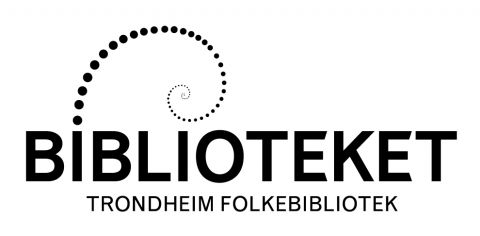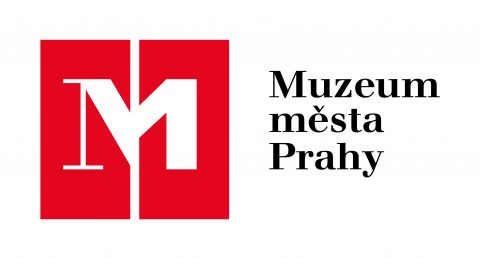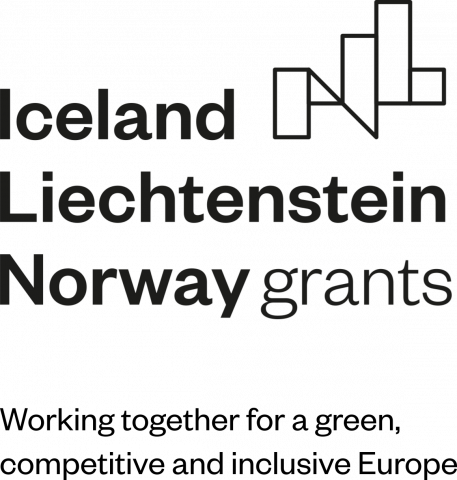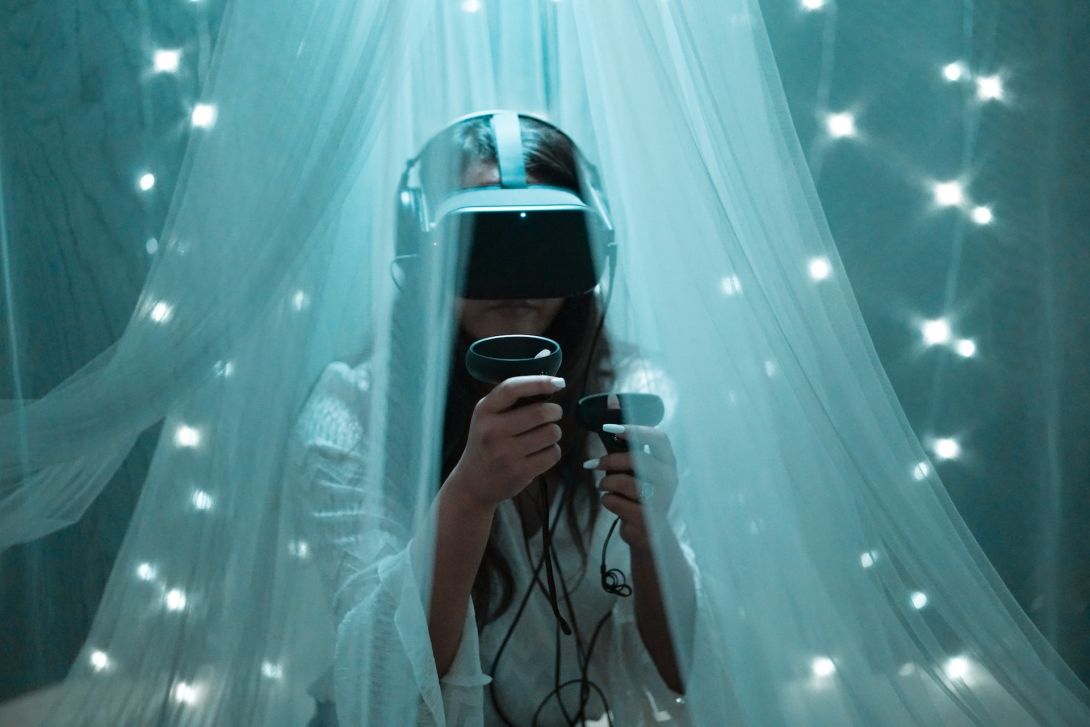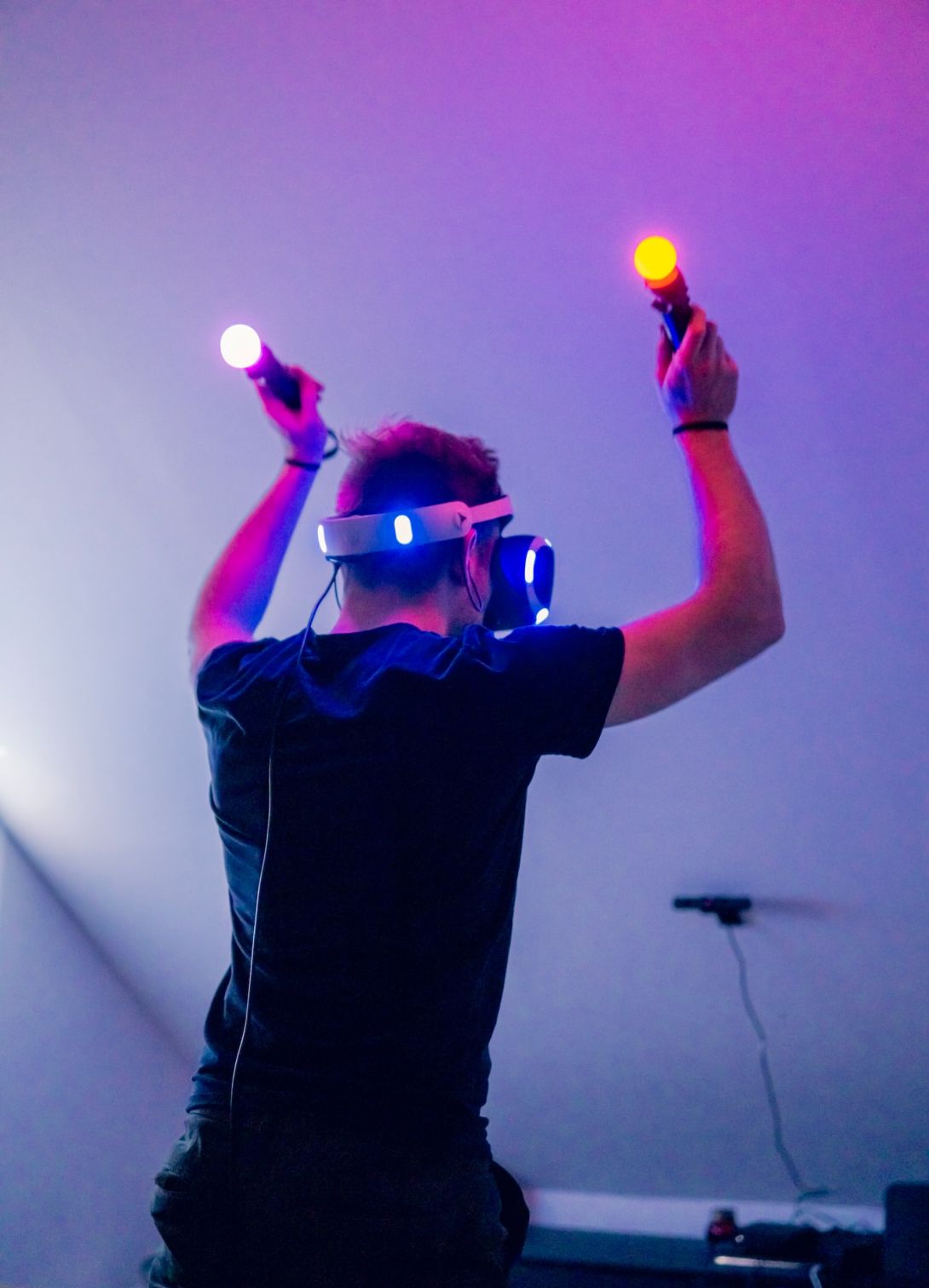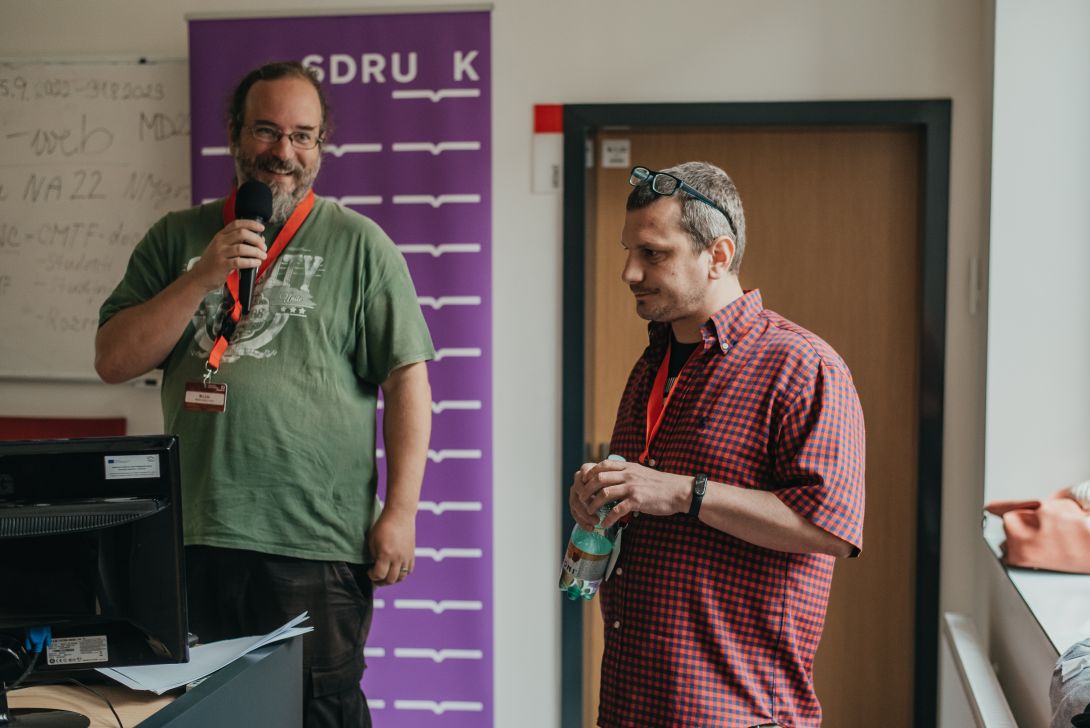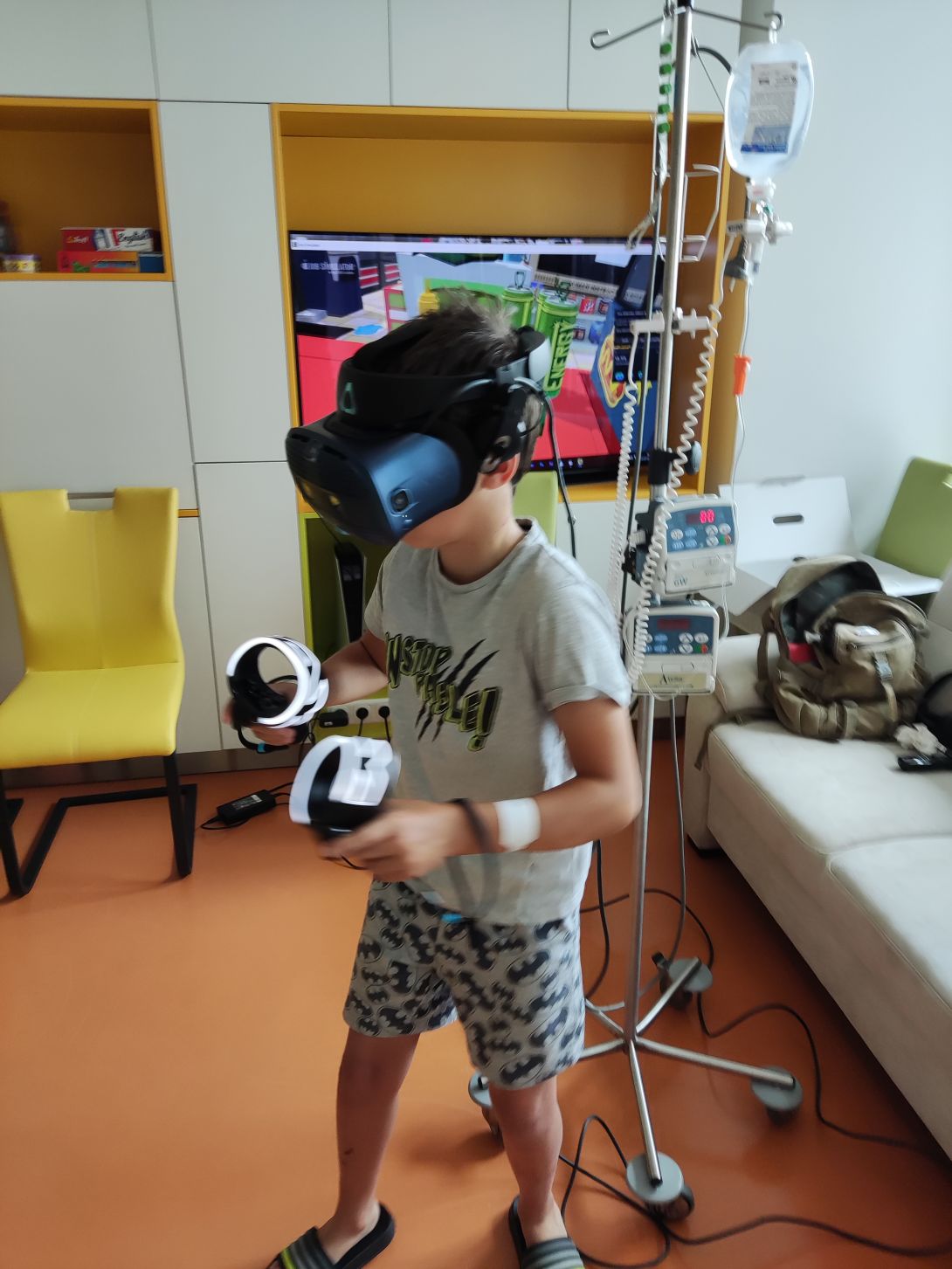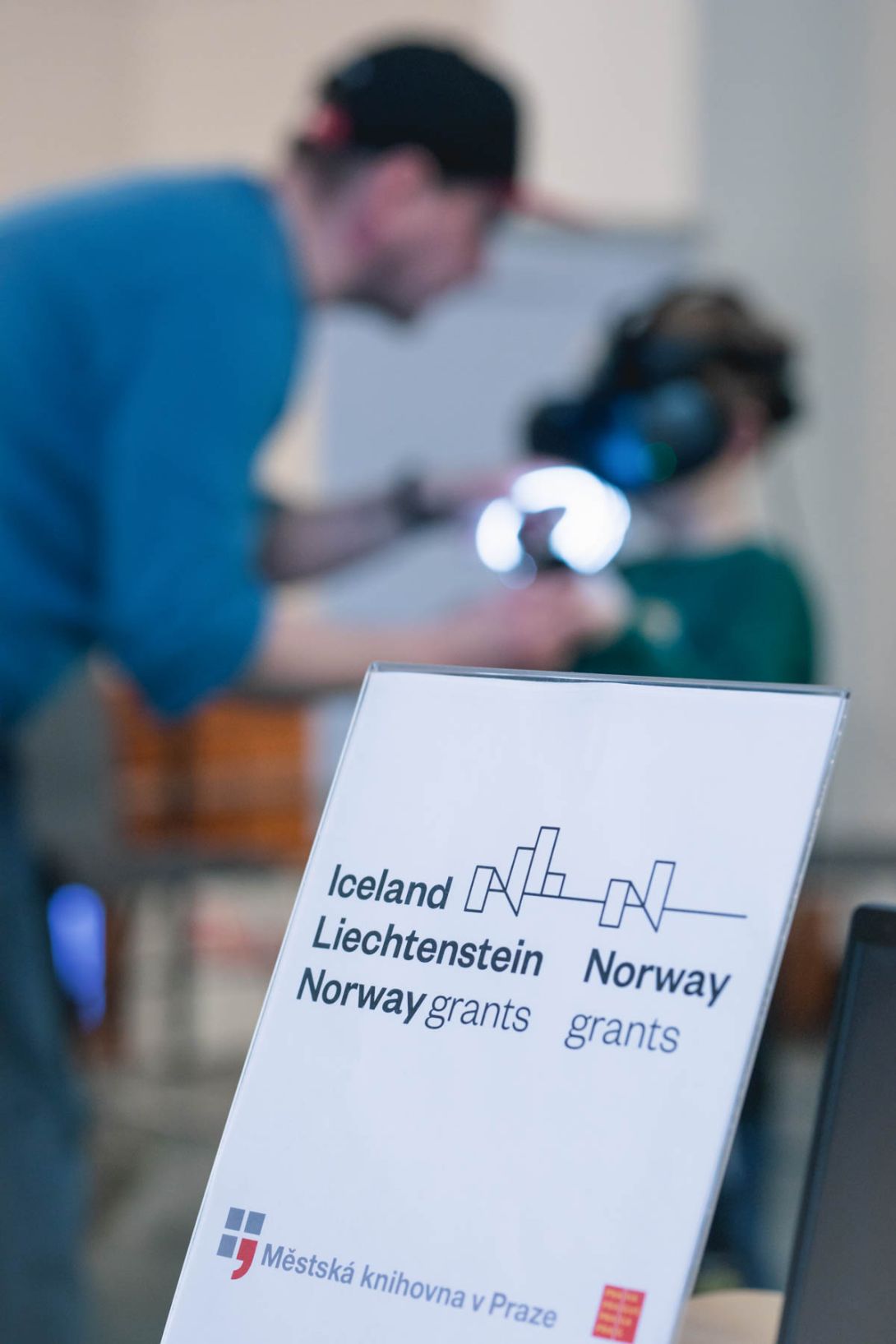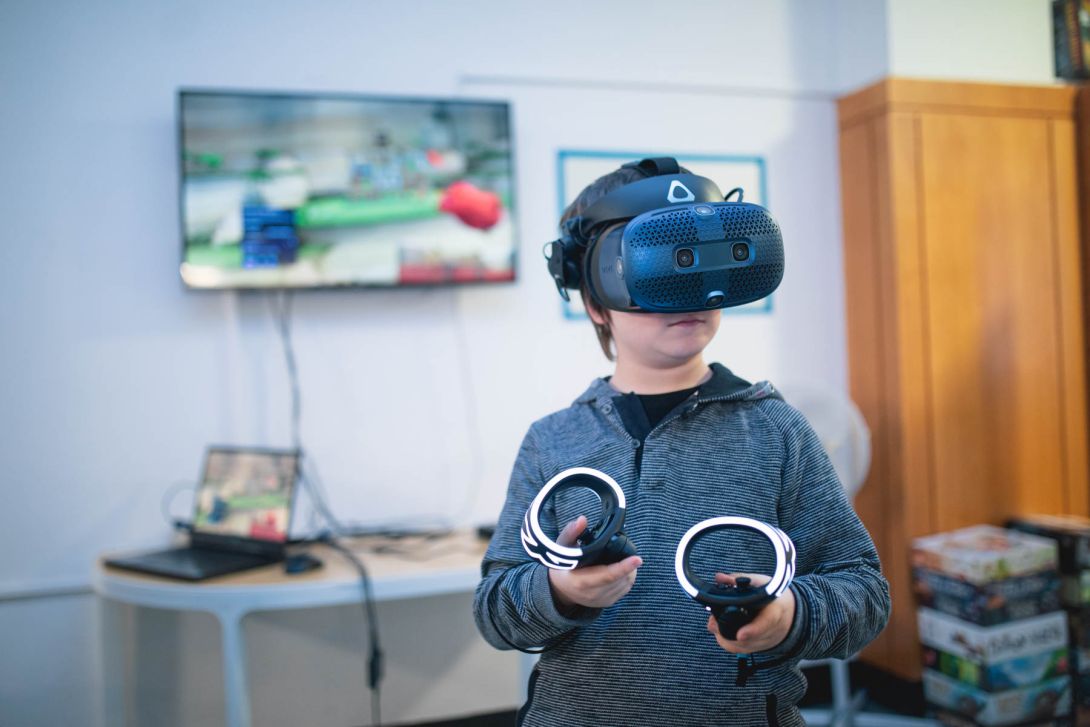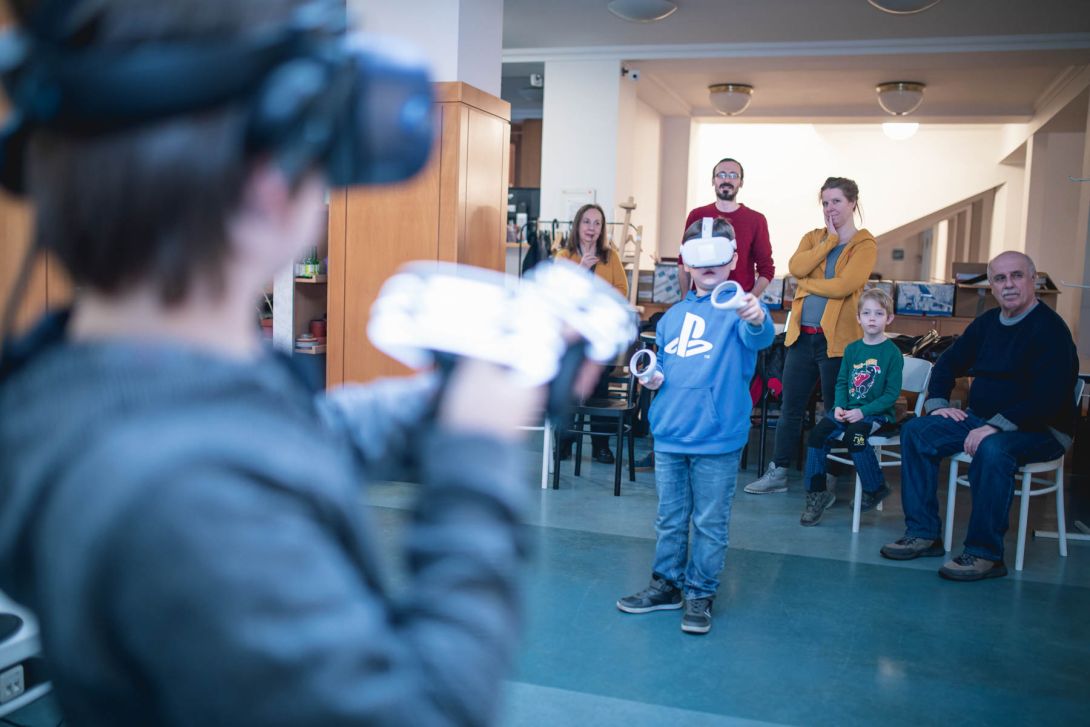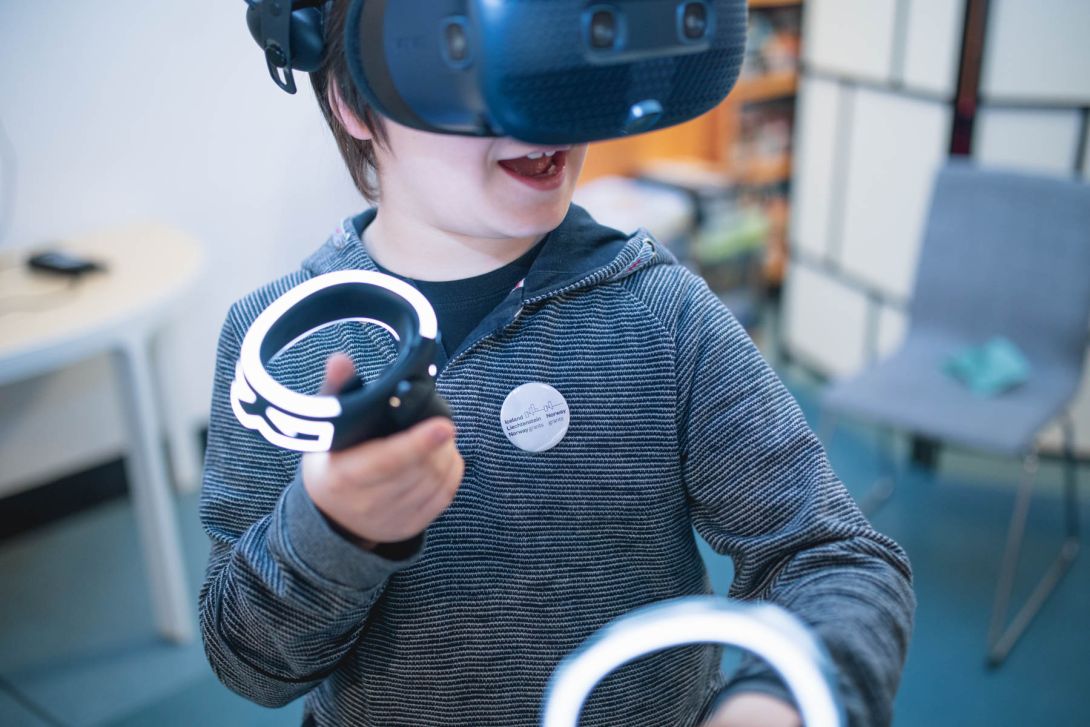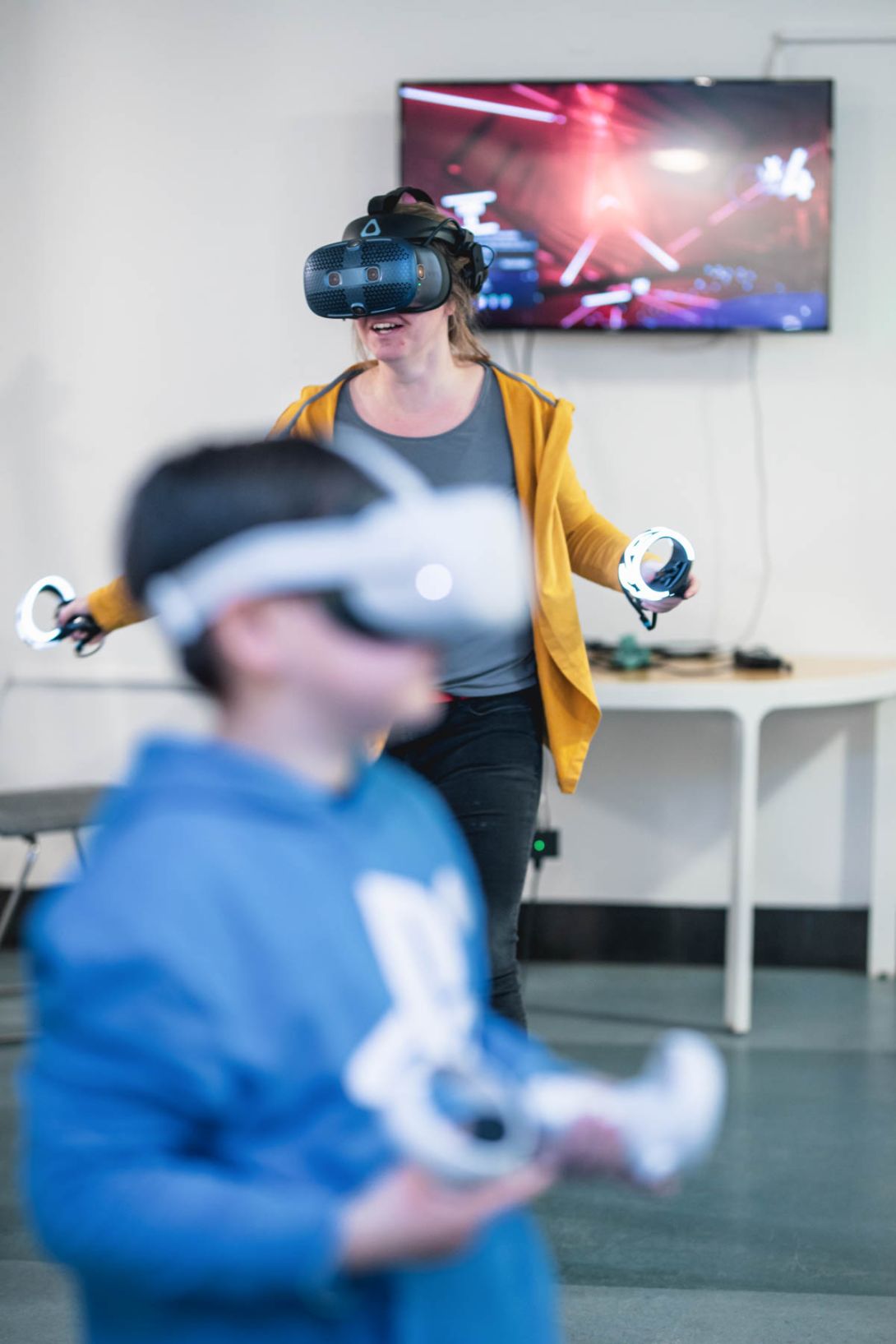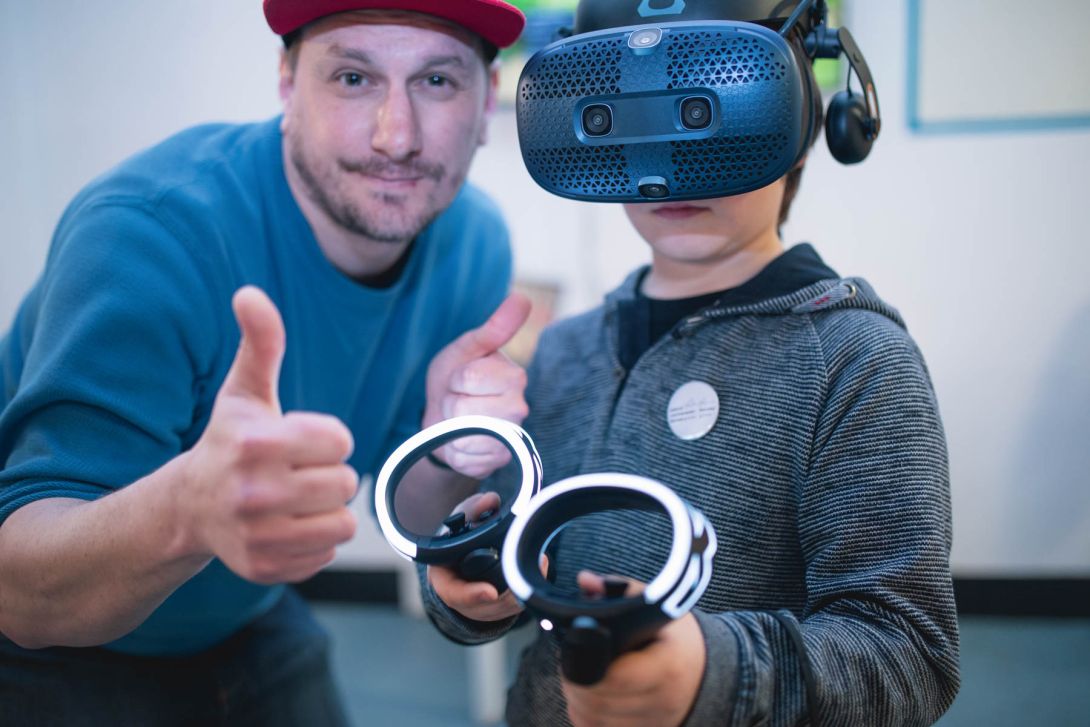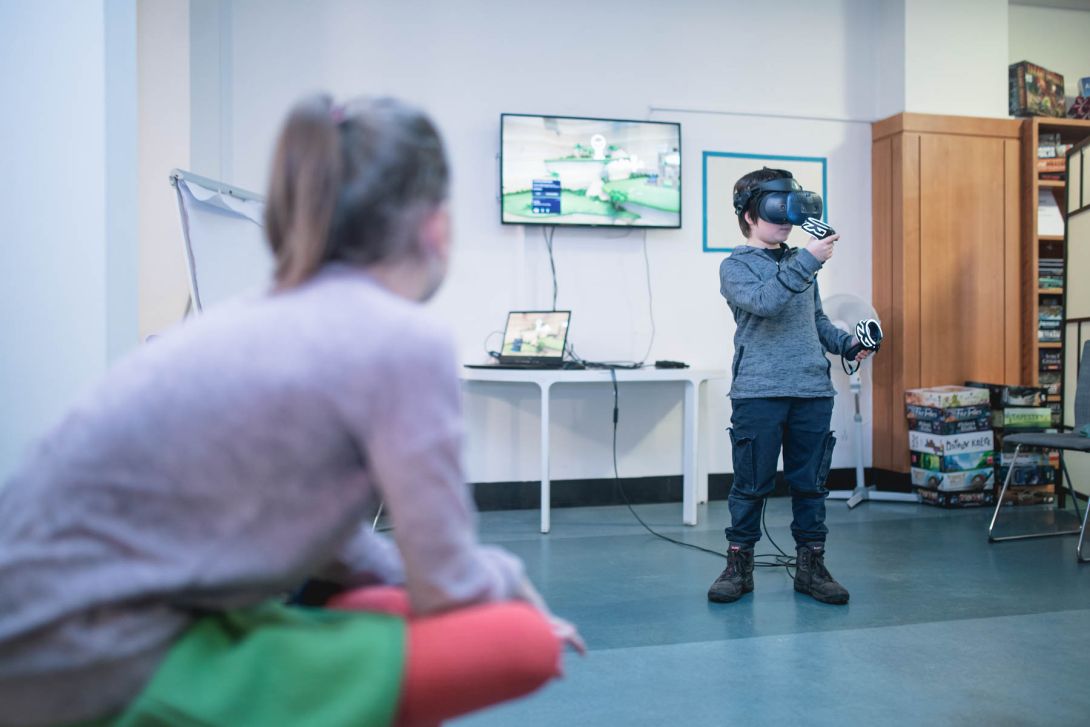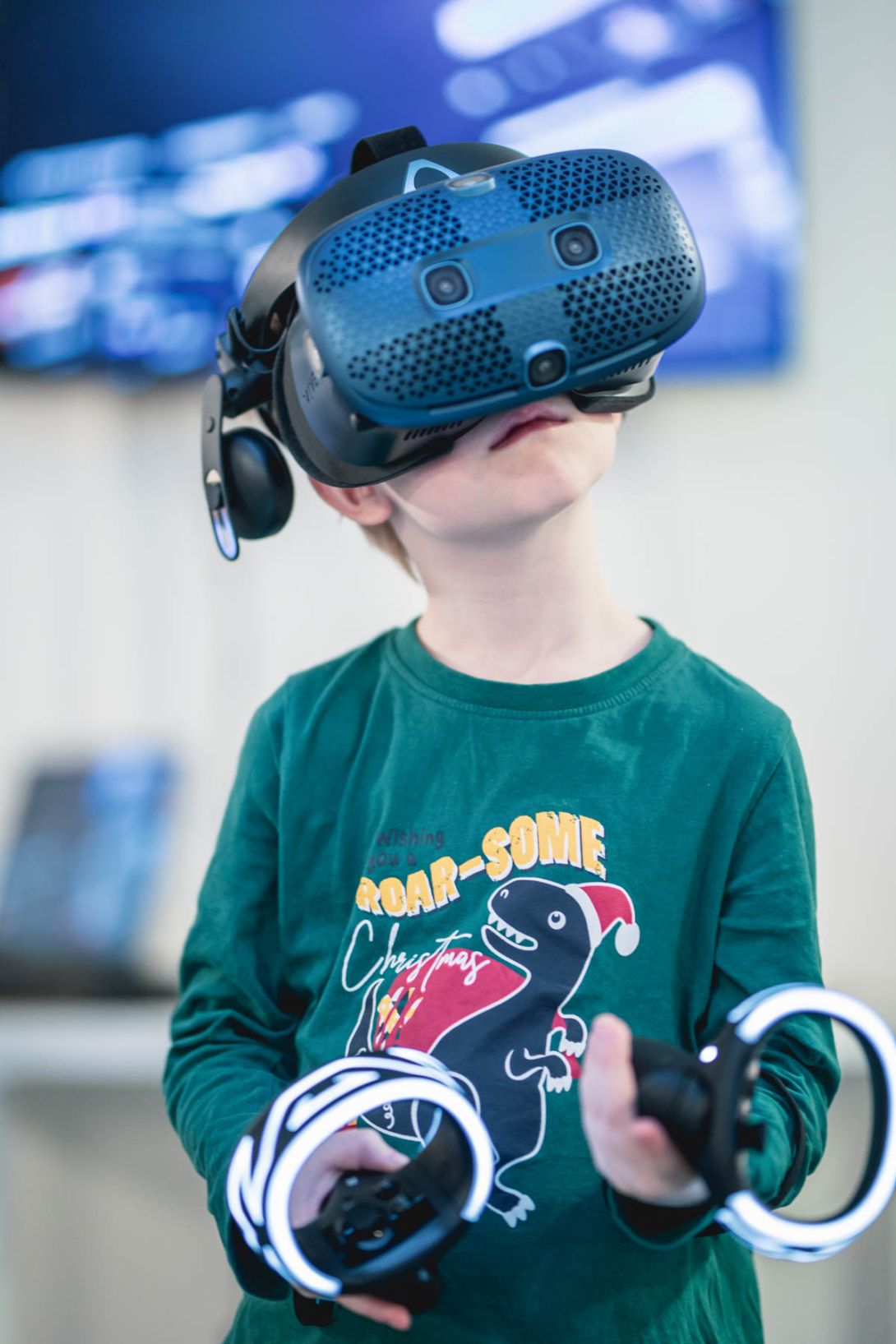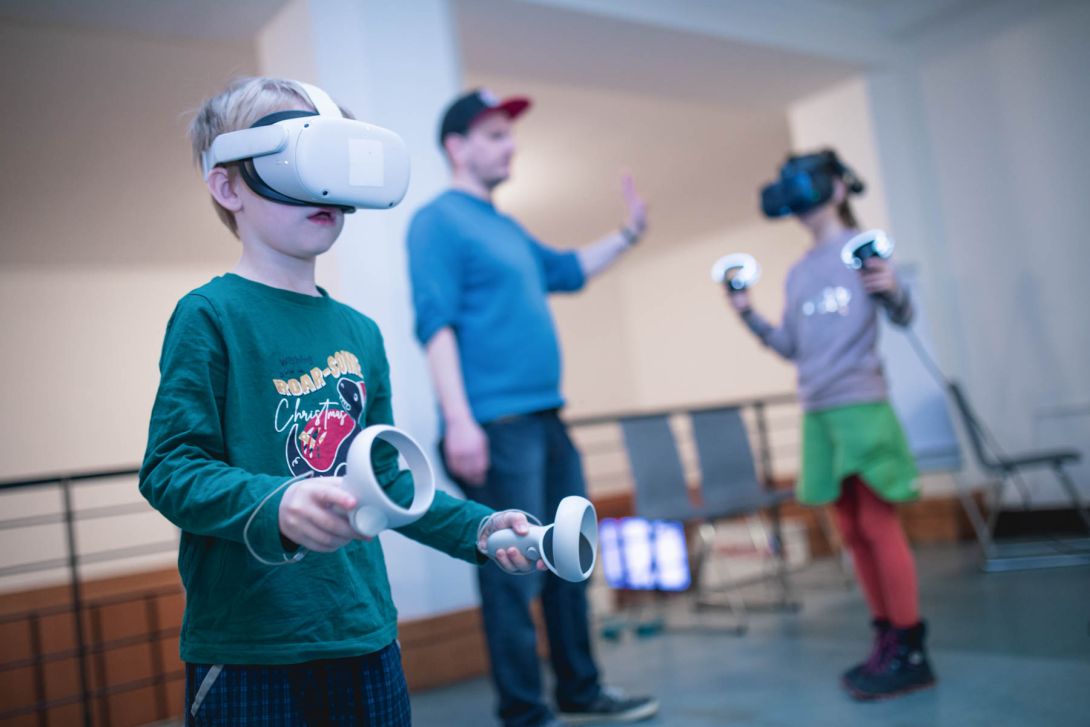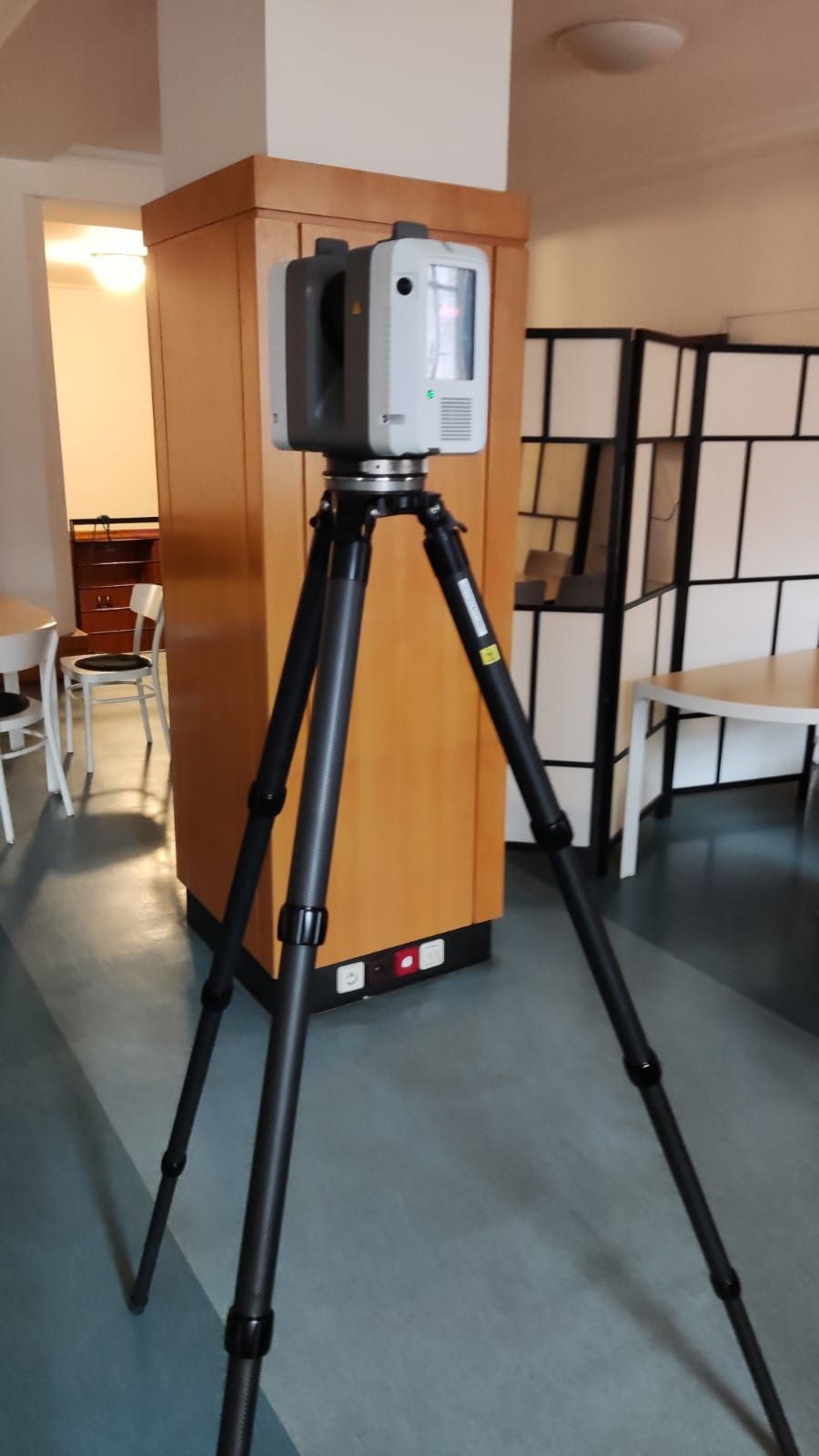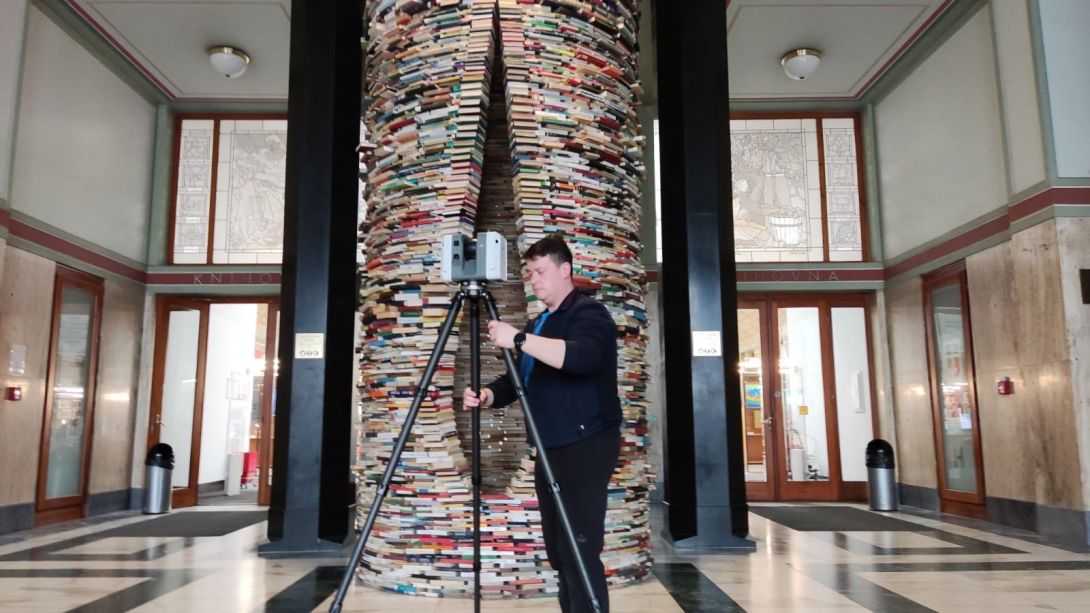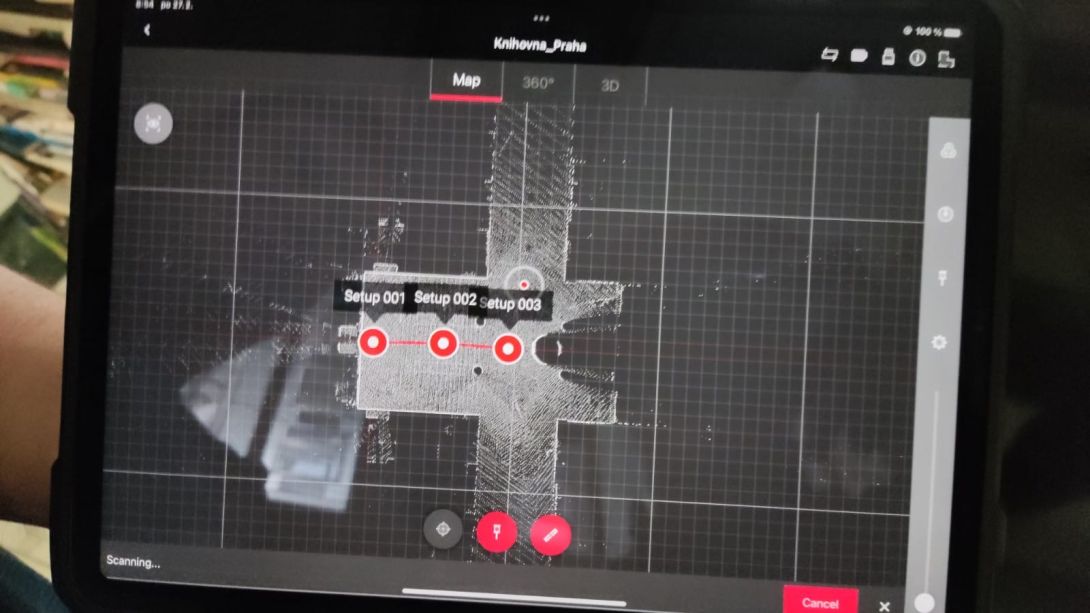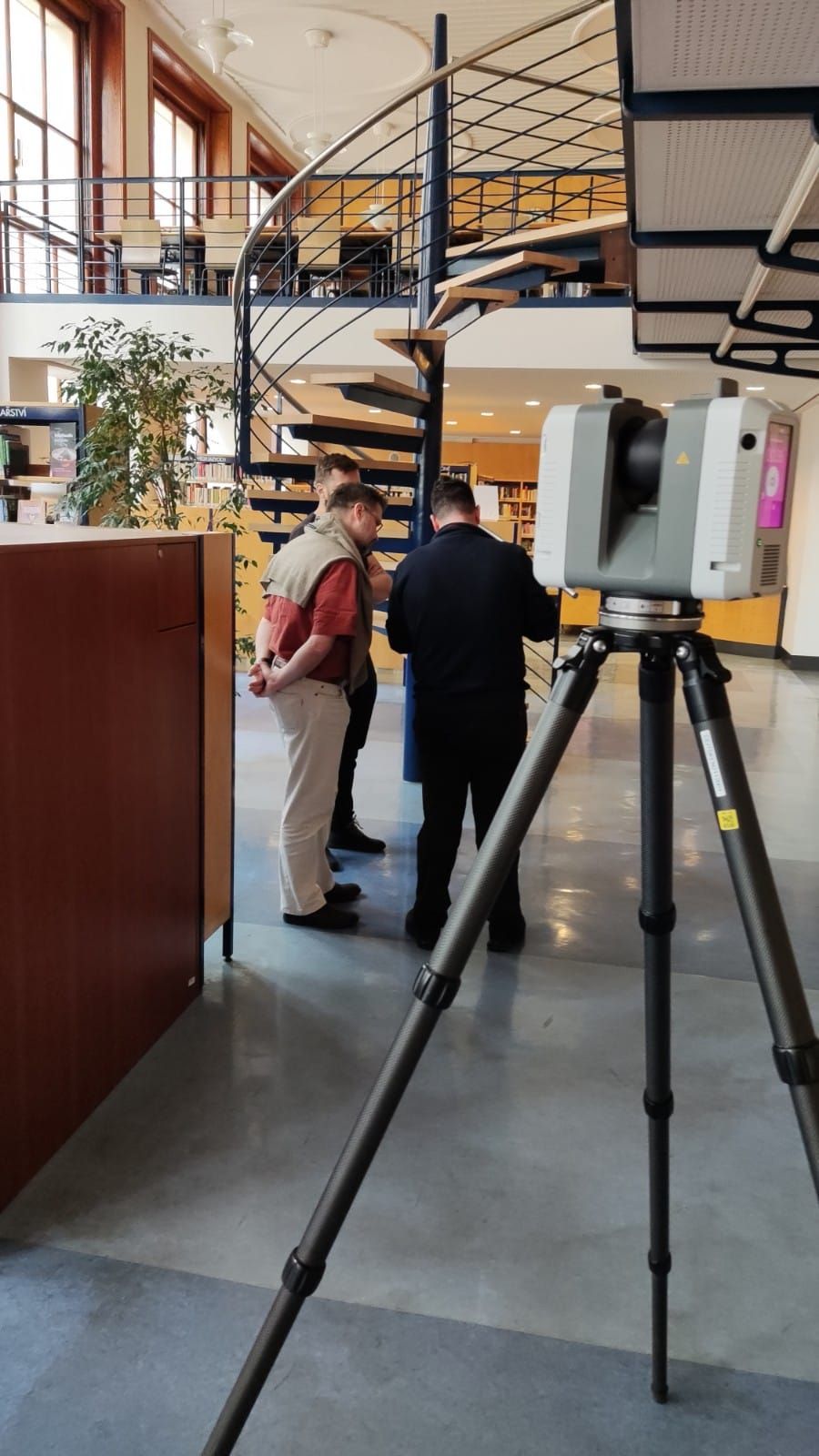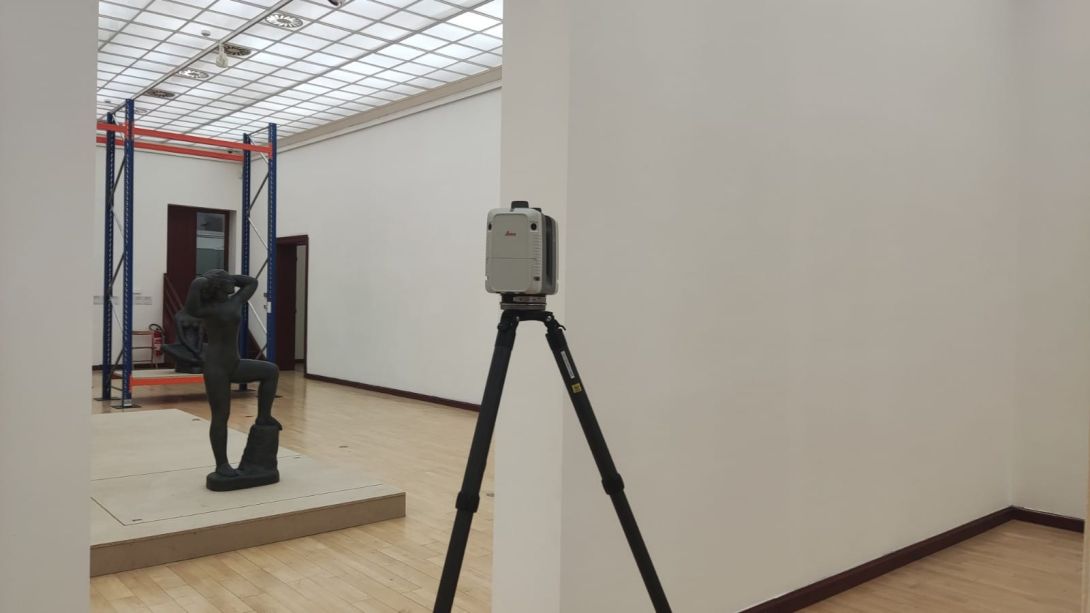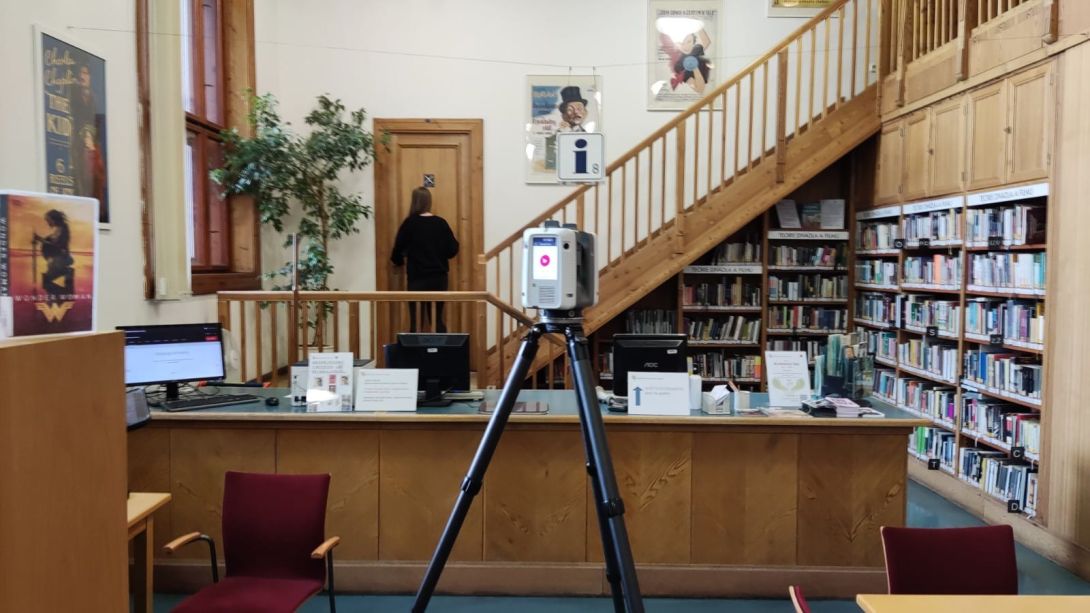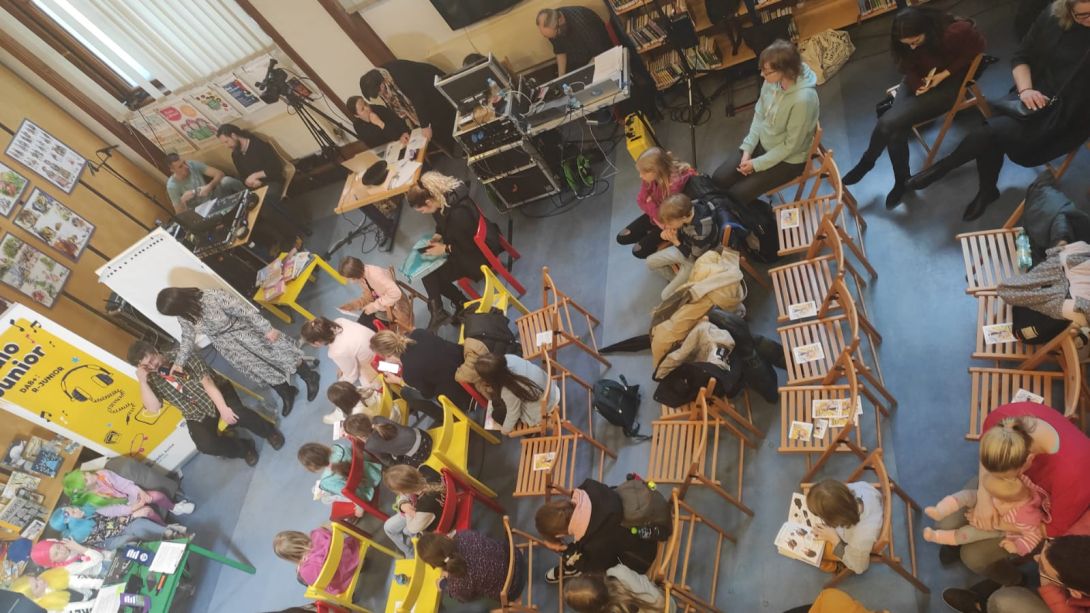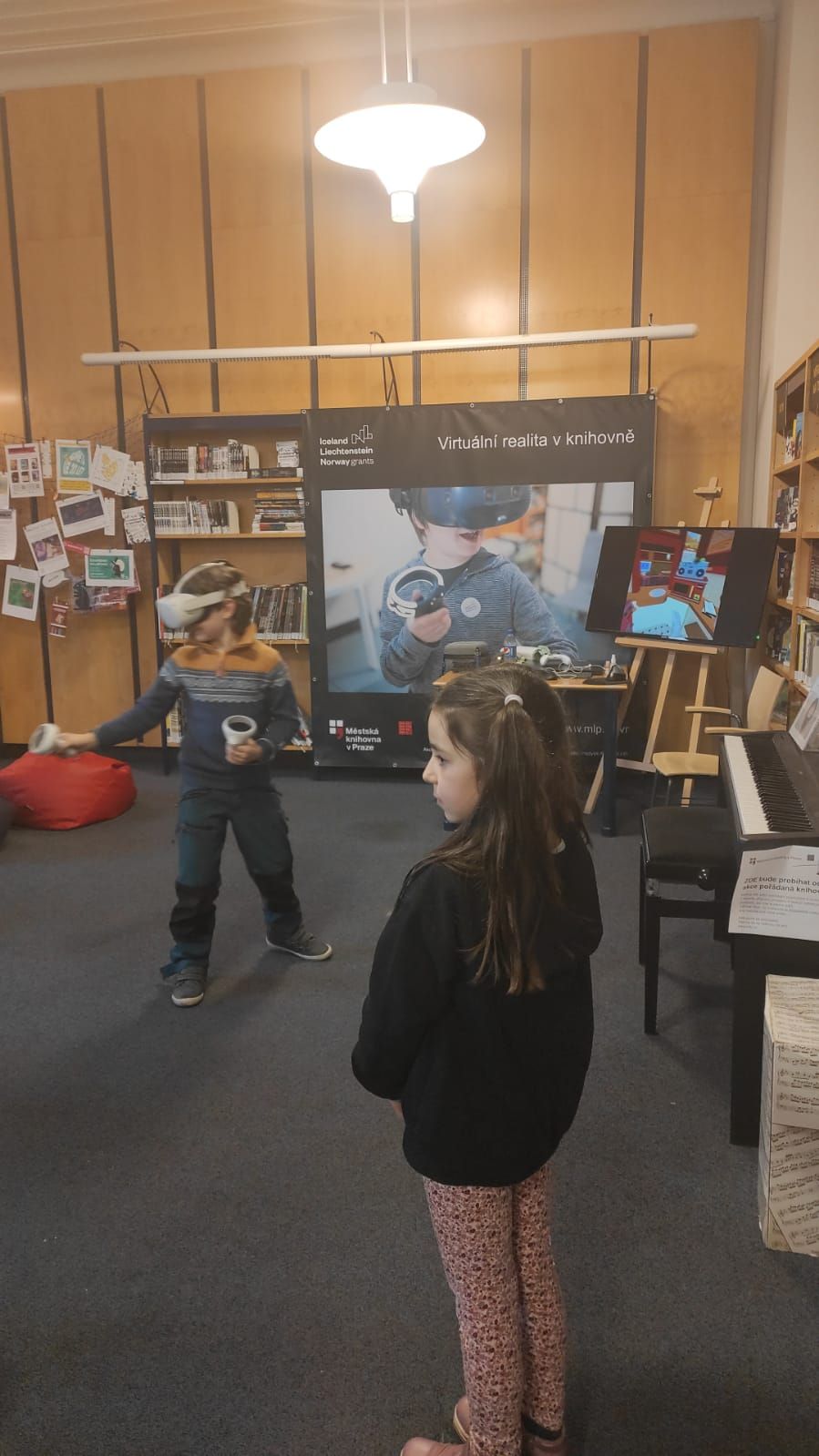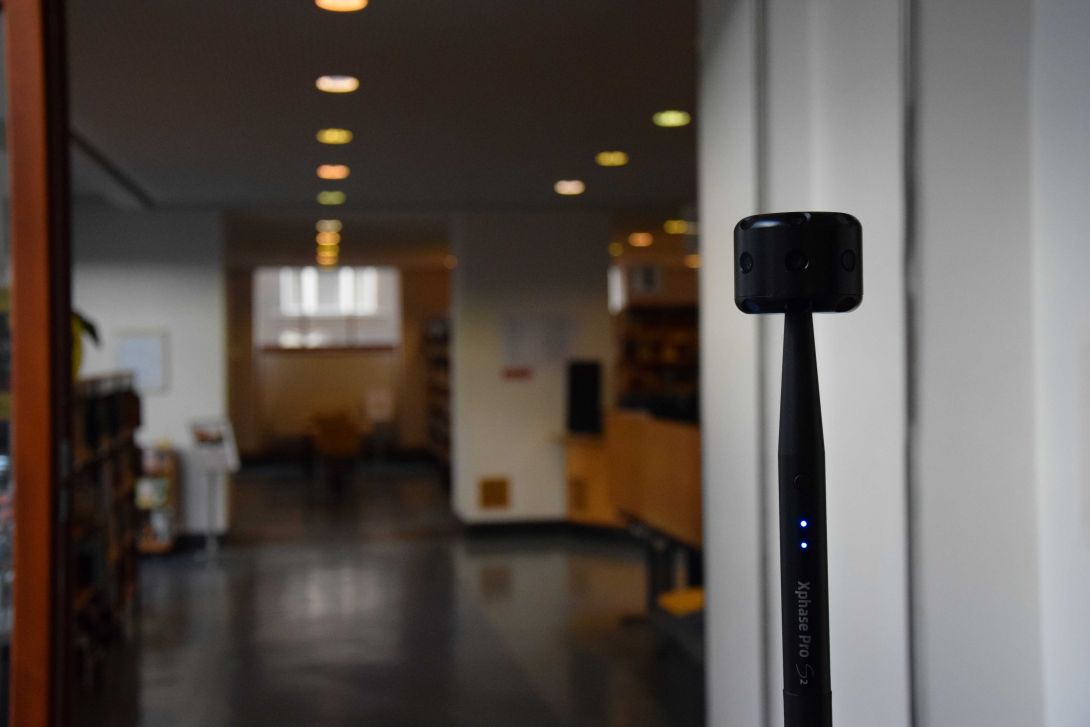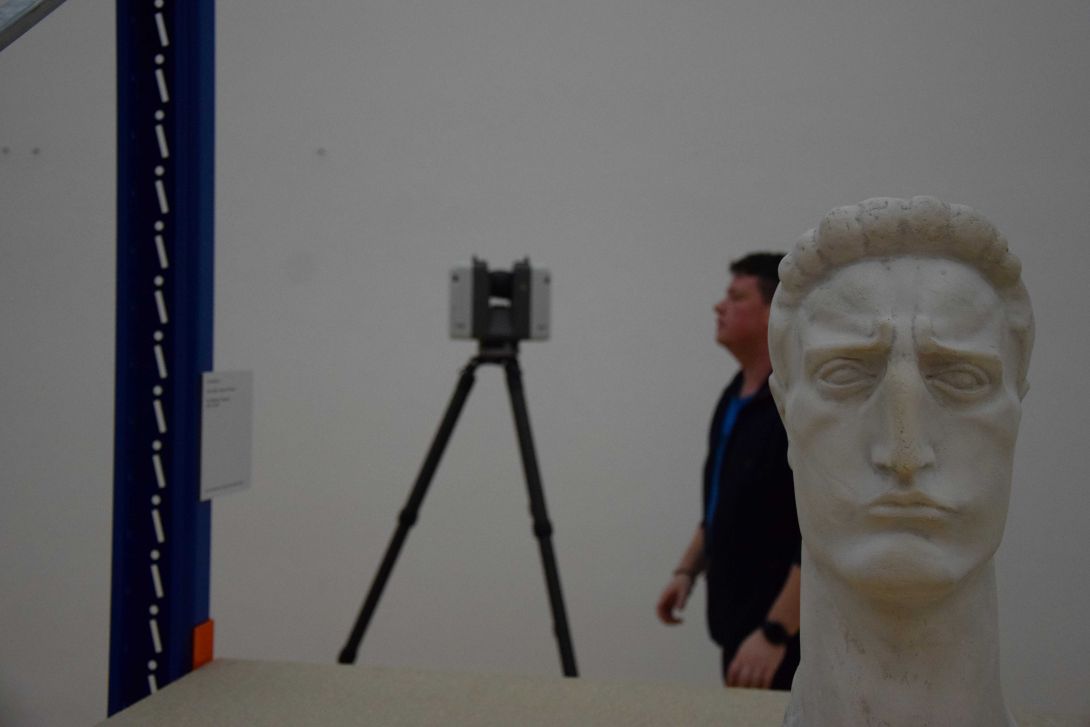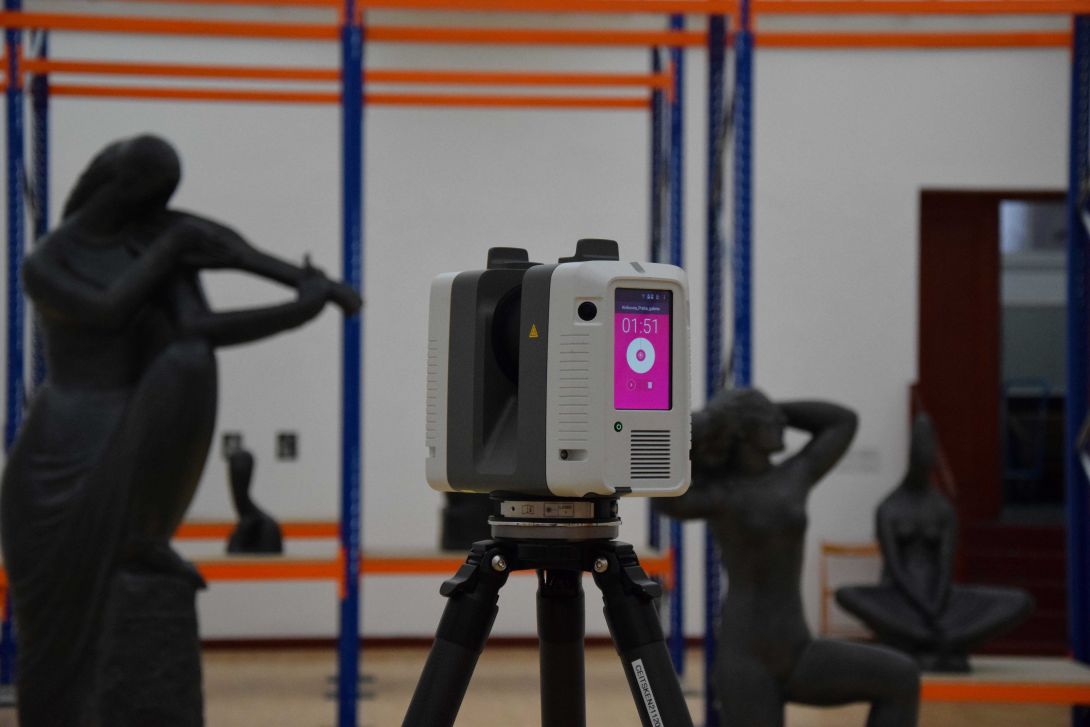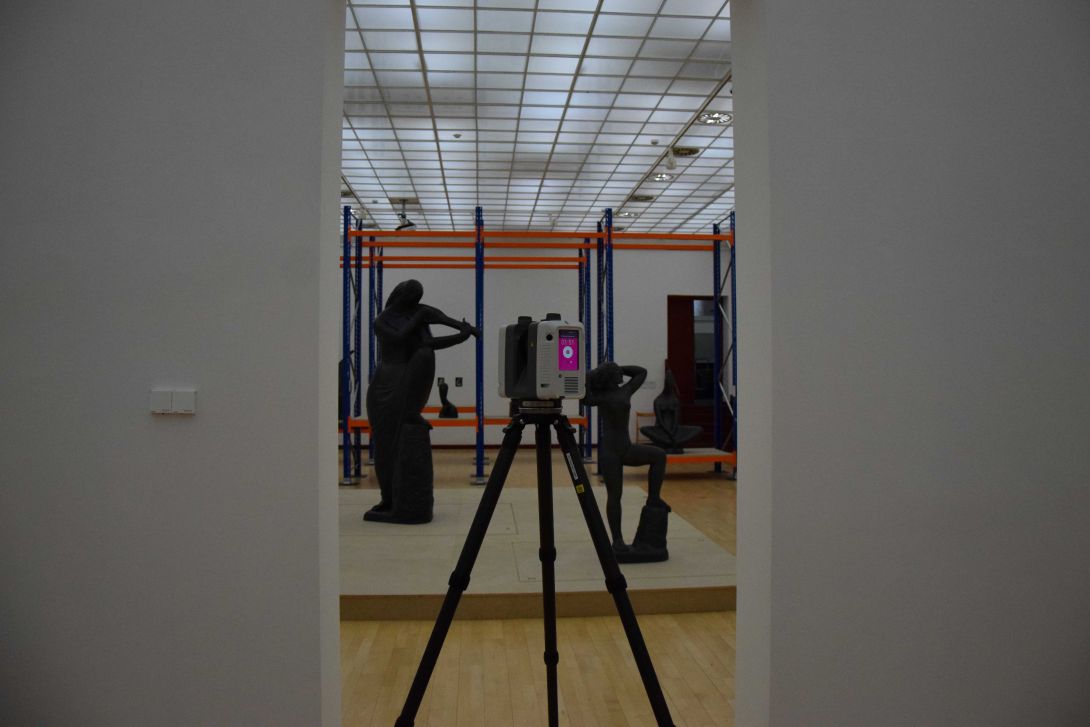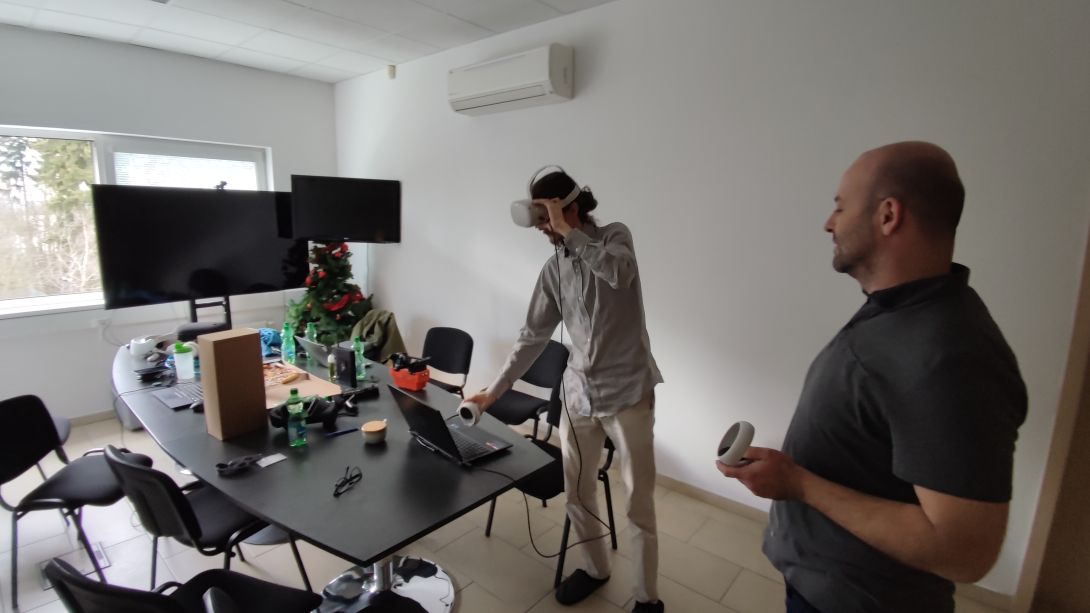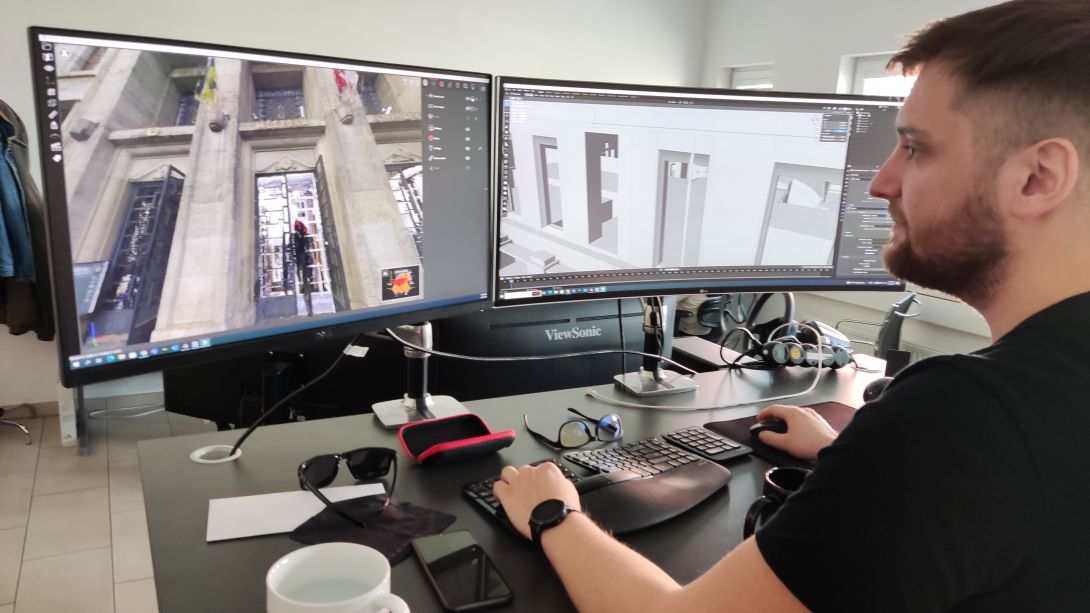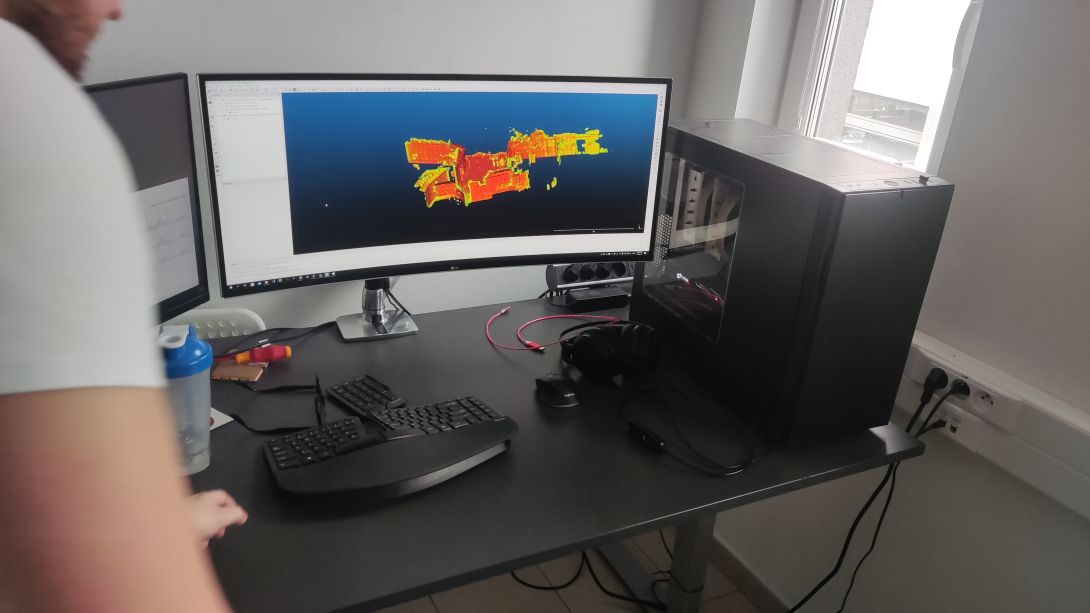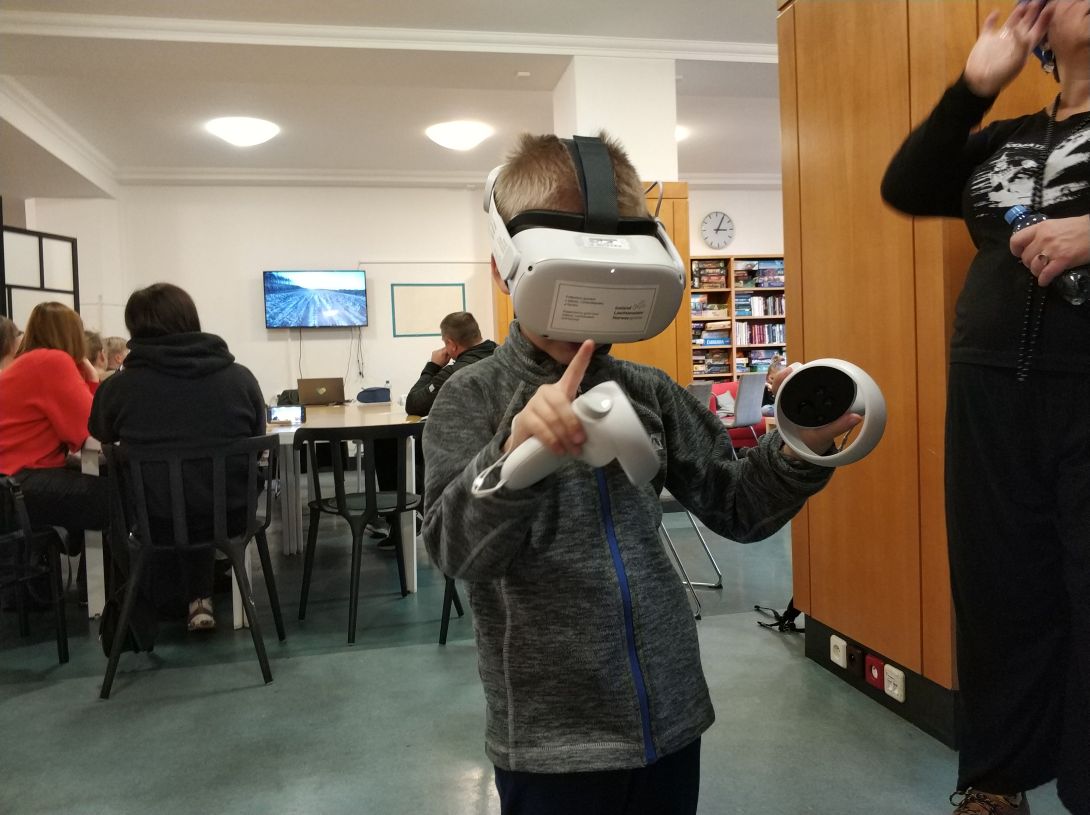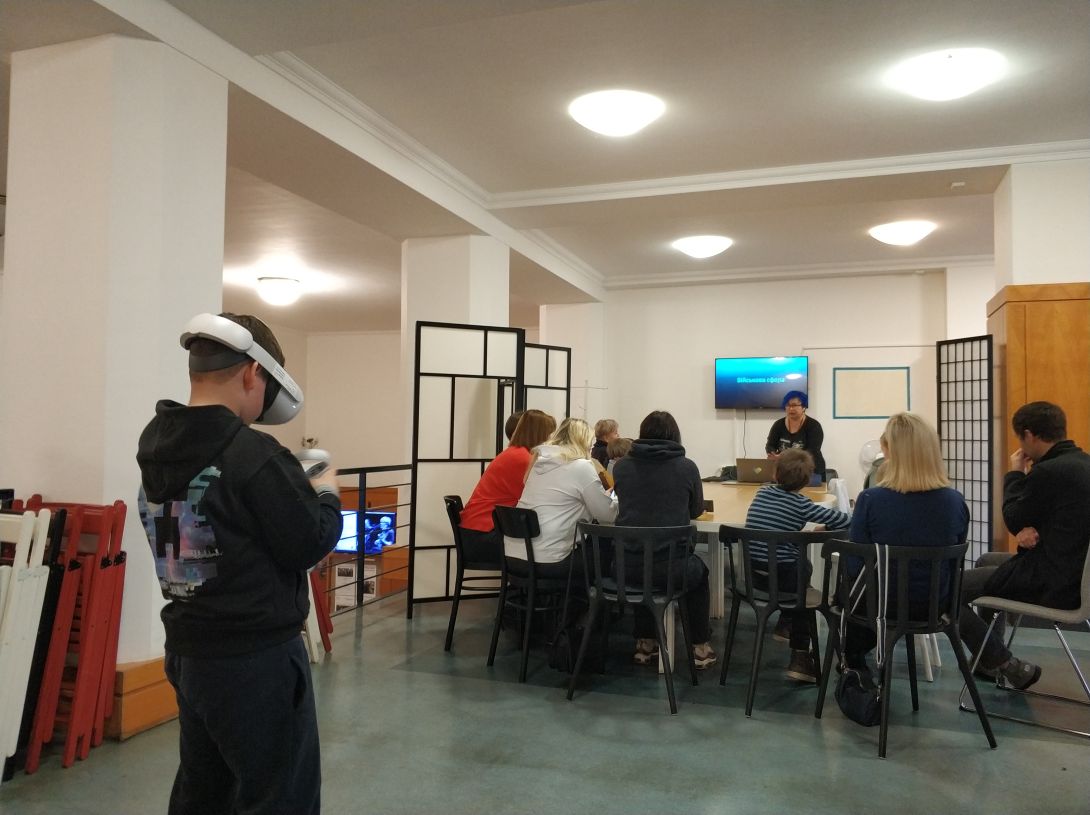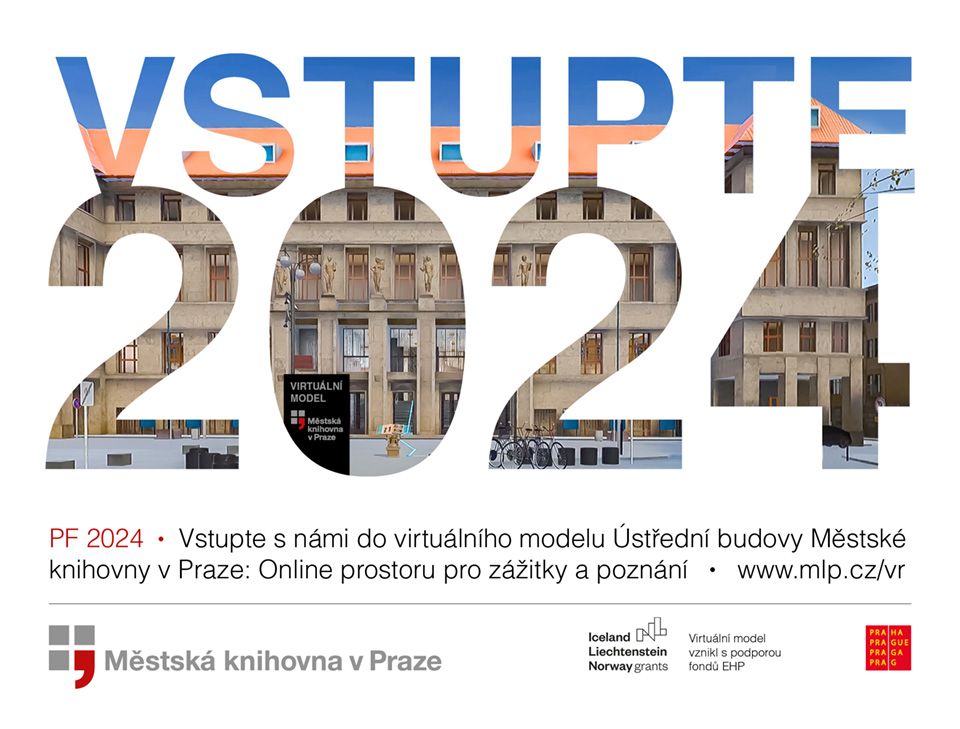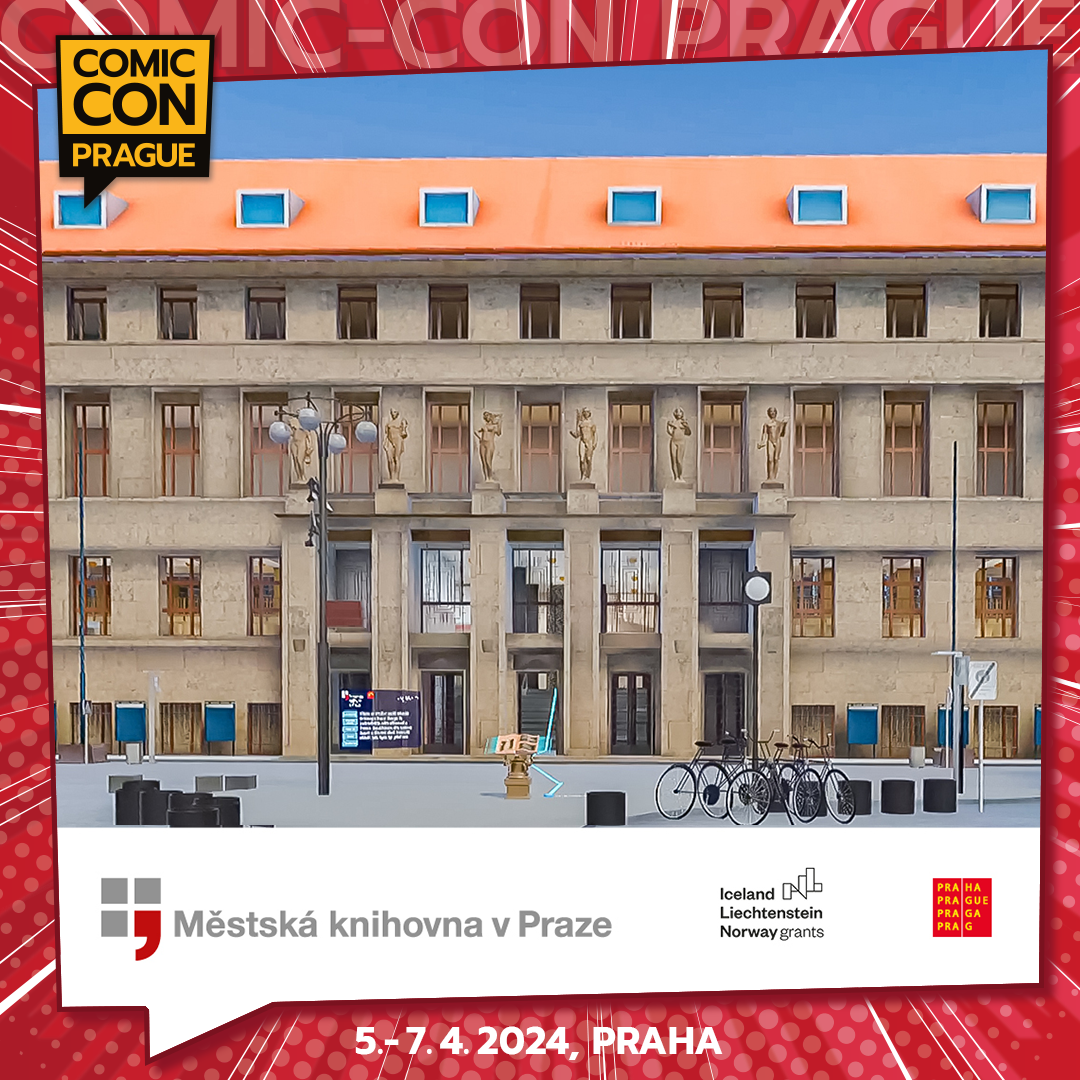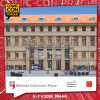Virtual reality in library
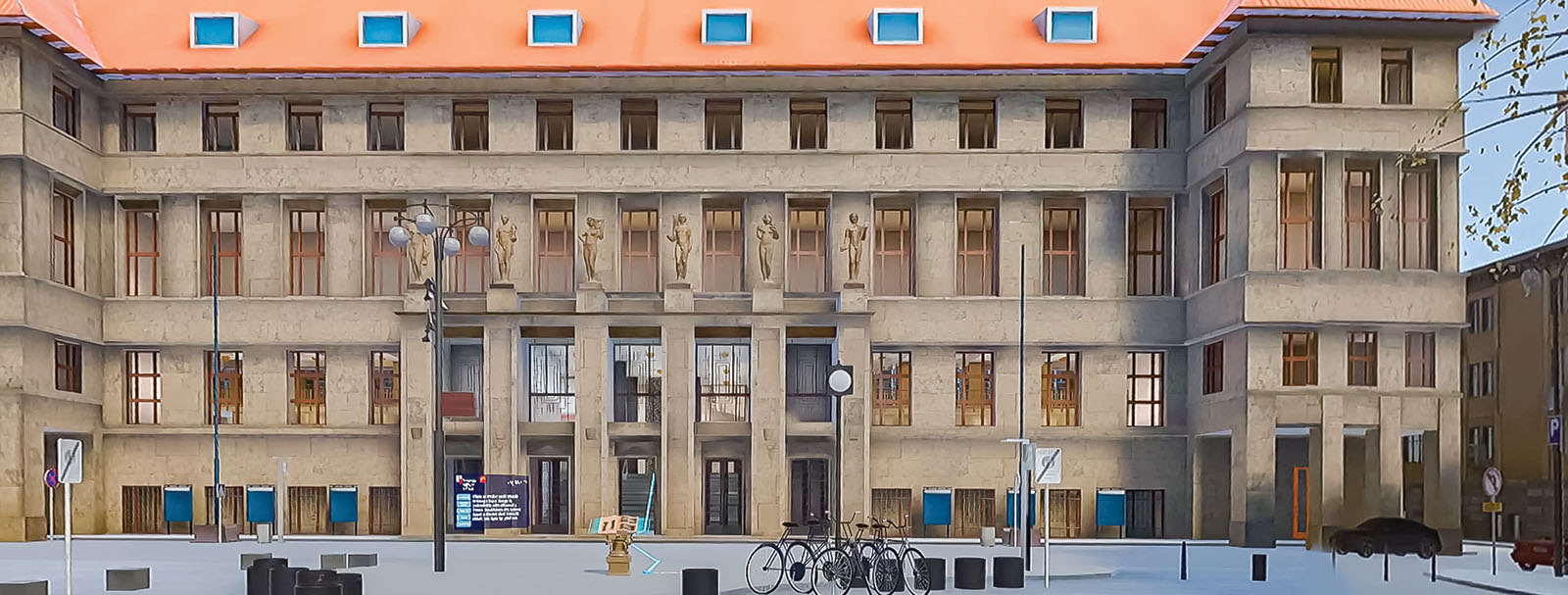
Warning: You are viewing an old version of the website
New version: mlp.cz/vr
Virtual reality is no longer just an offshoot of the gaming entertainment industry, but its potential is moving into the commercial and educational spheres. Libraries are institutions that have long profiled themselves as a major player in informal education. Therefore, the Municipal Library in Prague has taken the theme of VR as its own and we will try not only to make the interesting, almost century-old history of the library building on Mariánské náměstí accessible in VR, but also to look at the library and its services with new eyes.
The Prague Municipal Library (PML) organises the following activities in VR:
- individual VR lessons
- screenings of One World Festival films - from autumn 2024
- memory training for seniors in cooperation with the National Institute of Mental Health
- programmes for schools, children's groups, interest groups
- VR events for the general public
- exhibitions in the Artotheque virtual gallery (there is a possibility to realise your exhibition)
With the support of EEA Grants 2014 - 2021, the Municipal Library in Prague presents its own VR application VISIOLIBRUM.
- Visiolibrum app offers a time travel into the history of the Central Library building
- It consists of five chapters and gives access to selected parts of the Central Library building in Prague
- Takes visitors back to the First Republic, the Protectorate or the period of normalisation
- Each chapter offers several period and interactive elements as well as a thematic mini-game
- The aim of the short virtual experience is not only to introduce the historically and architecturally valuable building, but above all to offer to try out the possibilities of the virtual environment
- The Gallery space serves as an exhibition space not only for aspiring artists, but for anyone interested in presenting their work in a VR environment
- The VR HUB is the second, sister application, it is a simplified desktop environment that is adapted to run applications in a safe and isolated way, in which it is possible to work with 3D objects
- The Visiolibrum and VR HUB applications are free to download and can be used for personal use, public outreach, education, and more.
- With virtual reality we carry out programs for schools, children, DDM, low-threshold clubs, senior clubs, interest organizations and the general public
- VR is available to everyone at MKP, we would be delighted if you approach us with an interest...
RECOMMENDED HW
- PC VR compatible headset
- AMD Ryzen 3 5600 processor or better
- 16GB RAM or more
- AMD RX 580 or better graphics card
- 20GB of free disk space or more
RECOMMENDED SW
- Steam VR
- Oculus VR
- Windows 10 and above
INSTRUCTIONS FOR STARTING PC VR APPLICATION
- Extract the RAR files to the folder of your choice.
- No installation is required.
- The application is launched with the VisioLibrum and Library HUB files which can be found in the VisioLibrum and Library HUB folders.
- When it starts, the Windows has protected your computer window pops up. Click here For more information and then click Run Anyway.
If you use Meta Quest Link, follow the official recommendations.
VR application download: https://web3.mlp.cz/vr-app/Visolibrumv32.zip
The current line-up includes Fantastic Nature (Jedličkův ústav), Comic-con 2024 Cosplay Gallery, and Books that came to life (Studio Zvit)
Best Practice: Download Virtual Reality Project in Municipal Library in Prague here: https://web3.mlp.cz/vr-app/Knihovna-VR-manual-en-15.5.pdf
If you have any questions, please write to: knihovna@mlp.cz
Want to experience virtual reality in a safe and free library environment?
The Visiolibrum app is suitable for children, young people, seniors and anyone interested in modern technology.
For more information about the programme and cooperation opportunities, please contact Martina Šedová: martina.sedova@mlp.cz
There are no individual lessons during the summer holidays.
Central Library
Mariánské náměstí 98/1, Prague 1
Music Department:
Individual VR lessons for children and adults, seniors, general public, group VR events
Individual lessons can be booked on Tuesdays from 4 to 6 p.m.
Booking: in person at the Music Department or by phone: 222 113 359
Children's department:
Individual VR lessons for children and adults, seniors, general public, group events focusing on children and youth
Individual lessons can be booked:: Thursdays - from 3 to 5 p.m.
Booking: in person at the children's department or by phone: 222 113 362
Opatov
Individual VR lessons for children and adults, seniors, general public, group VR events
Opatovská 1754/14, Prague 11, lessons take place in the PC classroom
Individual lessons can be booked: every Wednesday from 3 to 4 pm and every other Friday from 3 to 4 pm
Booking: in person at the branch or by phone: +420 770 130 258
Jezerka
Nuselská 603/94, Prague 4, ground floor of Agora
Individual VR lessons for children and adults, seniors, general public, group VR events
Individual lessons can be booked: Thursdays from 4 to 6 pm
Booking: in person at Jezerka branch, phone: +420 770 130 224 or email: jezerka@mlp.cz
Prosek
Měšická 806/3, events take place on the first floor
Individual VR lessons for children and adults, seniors, general public, group VR events
Individual lessons can be booked: according to the possibilities of the branch by phone
Booking: in person at the Prosek branch, phone: +420 770 130 254.
Petřiny
U Petřiny 2511/1, Prague 6
Lessons with VR playstation, individual and group
Individual lessons can be booked: Wednesdays from 4 to 6 pm.
Reservations: in person at the Petřiny branch or by phone: + 420 770 130 242
Bibliobus
Events take place in the area inside the Bibliobus, at primary schools where the Bibliobus has its regular stops, at festivals and other events for the general public
Booking: phone +420 731 437 184
_____________________________________________________________________________________________________________________________________
We offer VR only to registered readers, also to the general public during events
We offer VR to readers over 12 years of age, younger readers only when accompanied by a responsible person
VR contraindications:
In general, VR is recommended for people without severe visual impairment (normal correction of dioptric glasses can be used) and neurological disorders (especially epilepsy, severe balance disorder, moderate or severe form of neurodegenerative disease - dementia), without serious mental illnesses impairing the possibility of perceiving reality.
- 5 . 4. 2024 - 2:00pm-10:00pm, 6. 4. 9:00am-10:00pm, 7. 4. 9:00am-8:00pm - Comic-con
- 8. 4. 2024 - 10:00 -12:00 - Forum - Visiolibrum App - Workshop (event is for library staff)
- 8. 4. 2024 - 10:30 - 11:30 - Forum - lecture by a librarian from a partner library in Norway (event is for library staff)
- 9 4. 2024 - 15:00 - 18:00 - VR in the library - House of Children and Youth Prague 5 - MKP music department (closed group)
- 10. 4. 2024 - 16:00 - 18:00 - VR for the public, MKP Petřiny
- 11. 4. 2024 - 17:00-19:00 - VR - Library and Czech Alzheimer's Society - MKP Velký mlýn
- 12. 4. 2024 - 10:00 - 12:00 - VR for seniors - MKP Prosek (closed group)
- 12. 4. 2024 - 16:00 - 18:00 - opening of the exhibition of paintings painted in VR - digital illustrations - Ukrainian group, MKP Mariánské nám. 1, space of the magazine reading room
- 12. 4. 2024 - 17:00 - 19:00 - VR for the public, MKP Prosek
- 13. 4. 2024 - 16:00 - 19:00 - VR for public (families) - Child in Dlouhá, Theatre in Dlouhá
- 18. 4. 2024 - 13:00 - 16:00 - VR closed group - Jedličkův ústav
- 22. 4. 2024 - 9:00 - 12:00 - VR closed group - Alzheimer centrum Kobylisy
- 24. 4. 2024 - 17:00 - 19:00 - VR for public - MKP Břevnov
- 24. 4. 2024 - 17:00 - 19:00 - VR for the public - MKP H55 Hloubětín
- 25. 4. 2024 - 13:00 - 16:00 - VR closed group, Jedličkův ústav
- 24. 4. 2024 - 17:00 - 19:00 - VR for the public - MKP H55 Hloubětín
- 02. 03. 2024, 09. 03. 2024, 16. 03. 2024, 23. 03. 2024, 30. 03. 2024 - Saturdays - 10:00 - 12:00 - Ukrainian Group - virtual reality painting course Open brush - closed group - branch Smichov
- 04. 03. 2024, 11. 03. 2024, 18. 03. 2024
- Mondays - 10:00 - 12:00 - NUDZ - virtual city - closed group - digitalization department Provaznicka
- 04. 03. 2024 Conference Visiolibrum, branch Petřiny from 13:00
- 04. 03. 2024 VR workshop - the future of libraries
- 04. 03. 2024 VR workshop - EXE - VR+AR in industry, world
- 04. 03. 2024 VR - App demonstration Visiolibrum
- 05. 03. 2024 17:00 - 19:00 VR for the public MKP Prosek
- 08. 03. 2024 15:00 - 19:00 - VR for public, community centre Creative House of Eliška Pešková, Eliška Pešková 333/7, Smíchov 5, 150 00 Prague 5
- 08. 03. 2024 10:00 - 12:00 - opening of the exhibition Fantastic Nature - Jedličkův ustav - Central Library
- 13. 03. 2024 17:00 - 19:00 - VR for public - scout group + closed group - MKP Petřiny
- 15. 03. 2024 10:00 - 11:00 - Inspiromat for librarians
- 20. 03. 2024 16:00 - 18:00 - VR for the public - MKP Rajská zahrada
- 22. 03. 2024 17:00 - 19:00 - VR for the public - Night with Andersen - MKP Petřiny
- 2. 2. Club SVČ Jednička 14:00 - 16:30, closed group
- 3. 2. Digital illustration: drawing with VR technology, 10:00 - 12:00, workshop in Ukrainian language, Smíchov branch
- 5. 2. Virtual City, 10:00 - 12:30, closed group
- 10. 2. Digital Illustration: drawing with VR technology, 10:00 - 12:00, workshop in Ukrainian language, Smichov branch
- 10. 2. GHMP
- 12. 2. Virtual City, 10:00 - 12:30, closed group
- 14. 2. VR presentations at Bibliobus stops15. 2. Virtual Reality at Petřiny, 16:00 - 18:00, event open to the public
- 17. 2. Digital illustration: drawing with VR technology, 10:00 - 12:00, workshop in Ukrainian language, Smíchov branch
- 19. 2. Virtual City, 10:00 - 12:30, closed group
- 20. 2. VR presentations at Bibliobus stops
- 23. 2. Virtual reality for seniors in Prosek, 9:00 - 13:00, closed group
- 24. 2. Digital illustration: drawing with VR technology, 10:00 - 12:00, workshop in Ukrainian language, Smíchov branch
- 26. 2. Virtual Reality at the Jedlička Institute, 9:00 - 12:00, closed group
- 26. 2. Virtual City, 10:00 - 12:30, closed group
- 26. 2. Pacific Low Threshold Club - VR Basics, 3:00 - 5:00 p.m. Central Library, closed group
- 28. 2. Virtual Reality at the Jedlička Institute, 9:00 a.m. - 12:00 p.m., closed group
-
8.1.2024 - VR for Fokus Praha 14:00 - 17:00, Velký Mlýn, closed group
-
13.1.2024 - GHMP 13:00 - 18:00, https://www.ghmp.cz/doprovodne-programy/sobotni-vytvarny-workshop-film-jako-objekt-k-vystave-myslet-filmem/
-
15.1.2024 - Central Library, Mariánské náměstí 1, 14:30 - 17:30, NZDM Pacific - VR for beginners
-
16.1.2024 - VR app presentation at Bibliobus stops
-
17.1.2024 - VR for the public - Vysočany branch, 16:00 - 18:00, about the event
-
18.1.2024 - Presentation of Visiolibrum app for library staff, 9:00 - 12:30, Workshop
-
22.1.2024 - Virtual City - NUDZ, 9:30 - 12:30, Department of Digitization of the Library - Provaznická 385/3, Prague 1
-
29.1.2024 - Virtual City - NUDZ, 9:30 - 12:30, Department of Digitization of MKP - Provaznická 385/3, Prague 1
-
30.1.2024 - presentation of VR application at Bibliobus stops
-
2.12.2023 - Dive into the Future 13:00 - 16:30, Central Library, Workshop, the program will be in Ukrainian language, the event is open to the public
-
4.12.2023 - Central Library MKP, Clubhouse VR cognitive skills training for seniors, 10:00 - 12:00
-
6.12.2023 - VR in Velké Mlýn - children's organization - Kontajner Low Threshold Club - closed group
-
8.12.2023 - Basics of virtual reality for seniors - first steps, Prosek branch: from 9:30 to 12:30, cooperating organization Cultural Activation Centre for Seniors of Prague 9 - closed group
-
9.12.2023 - Dive into the future 13:00 - 16:30, Central Library, Workshop, the program will be in Ukrainian language, the event is open to the public
-
11.12.2023 - 9:30 - 12:30 - Basics of Virtual Reality for Seniors, Seniors Group Two - closed group
-
11.12.2023 - MKP Central Library, VR Clubhouse Cognitive skills training for seniors, 10:00 - 12:00 - closed group
-
12.12.2023 VR at Jedlička Institute from 13:30 - 17:30 - closed group
-
16.12.2023 GMHP - Introduction to art applications, event is open to the public
-
19.12.2023 - Fine Art in Virtual Reality, Jednička Leisure Centre, from 15:00 to 19:00
- 8.11.2023 Velký Mlýn 13:30 - 17:30, VR for seniors, in cooperation with CAP Mazurská
- 13.11.2023 - 10:00 - 12:00 excursion of MU students in Library Science (non-traditional library services including VR)
- 13.11.2023 Central Library of MKP, VR Clubhouse cognitive skills training for seniors, 10:00 - 12:00
- 18.11.2023 Dive into the future 13:00 - 16:30, Central Library, Workshop, the program will be in Ukrainian language, the event is open to the public
- 18.11.2023 The Night of Theatres - VR for the public from 17:00 to 22:00
- 20.11.2023 Central Library MKP, Clubhouse VR cognitive skills training for seniors, 10:00 - 12:00
- 20.11.2023 MKP Central Library, Music Department 3:00 - 6:00 p.m., VR for children - closed group
- 25.11.2023 Dive into the Future 13:00 - 16:30, Central Library, Workshop, program will be in Ukrainian language, event is open to the public
- 27.11.2023 Central Library MKP, Clubhouse VR cognitive skills training for seniors, 10:00 - 12:00
- 2.10.2023 Lecture by MUDr. Fajnerová - Central Library - Small Hall: memory training in a virtual city, beginning at 19:00, entrance fee 60 CZK.
- 4.10.2023 Virtual Reality in the Mill, from 14:30 to 18:00, seat reservation: velkymlyn@mlp.cz
- 9.10.2023 Senior Mondays, Central Library, from 15:00 to 19:00
- 17.10.2023 Jedlička Institute
- 23.10.2023 Virtual City, Central Library - Clubhouse, 10:00 a.m. to 12:00 p.m., Memory and other cognitive function training for seniors
- 30.10.2023 Virtual City, Central Library - Clubhouse, from 10:00 to 12:00, Memory and other cognitive functions training for seniors
- 12.9.2023 - Fokus Praha and MKP - Social Services Fair, from 11:00 to 16:00, Benešov
- 12.9.2023 - 14.9.2023 - Conference Libraries of Today 2023, Olomouc
- 14.9.2023 - Mental Health Weeks, Mariánské náměstí 1
- 20.9.2023 - Mutual Aid Day - Fair of Social Services and Non-Profit Organizations, Žofín, from 14:00 to 18:00
- 25.9.2023 - VR for the public, 25.9.2023, from 17:00 to 19:00, MKP Workshop
On 31.3.2023, the Central Library at Mariánské náměstí 1 will host a rich programme as part of the Night with Andersen. Radio Junior will be on site for the whole time, preparing a 6-hour live broadcast, which will be hosted by Klára Nováková and Petr Ševčík. Many interesting personalities will be coming to the library, such as actress Sara Sandeva, ten-year-old singer Chiara and literary tiktoker cojezoe_(Karolína Zoe Meixnerová).
The central theme of the Night with Andersen is story telling, and virtual reality cannot be absent. From 16:00 to 18:00 a VR specialist will be on hand to outline how story telling is handled by developers in virtual reality in the VR corner.
We look forward to seeing you there.
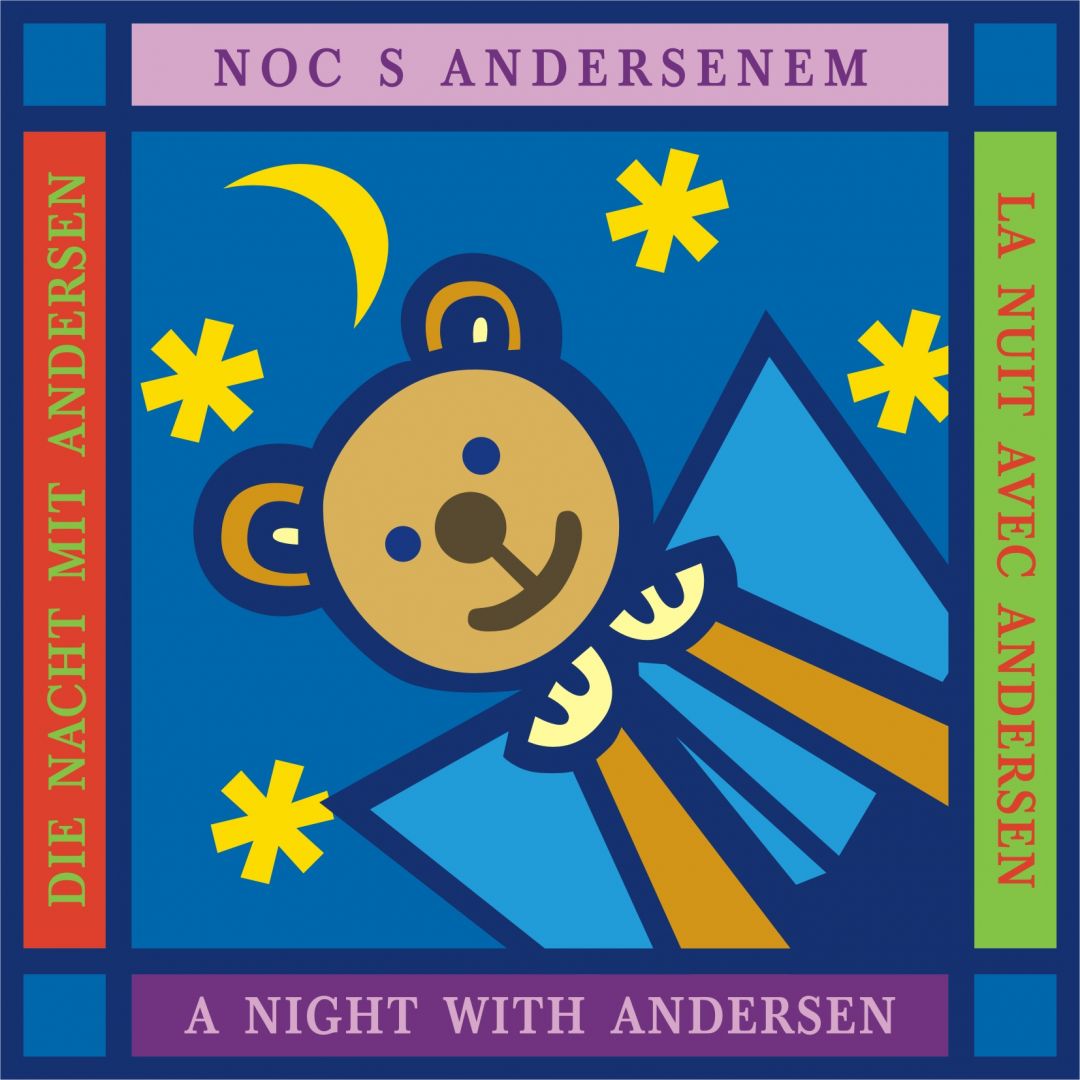
On the day of the half-term holidays we organized a virtual reality testing workshop. A group of 4 children (6-12 years old) and a few adults gathered, which was complemented at the end by Ukrainian children who were in the library on a field trip.
We had 2 headsets that the children took turns using. The children tried out different games and apps. Marek Ďuriš fitted each child with a headset and gave instructions on how to behave in virtual reality and then the children had fun. None of the children had any problems adapting to VR or the headset. Those children who did not have a headset spent time with Mr. Kopriva, who introduced several board games and the children were able to play them.
The adults also tried VR and everyone was literally thrilled. The whole event was organized under the auspices of the Norway Grants.
You can see photos from the event in our gallery.
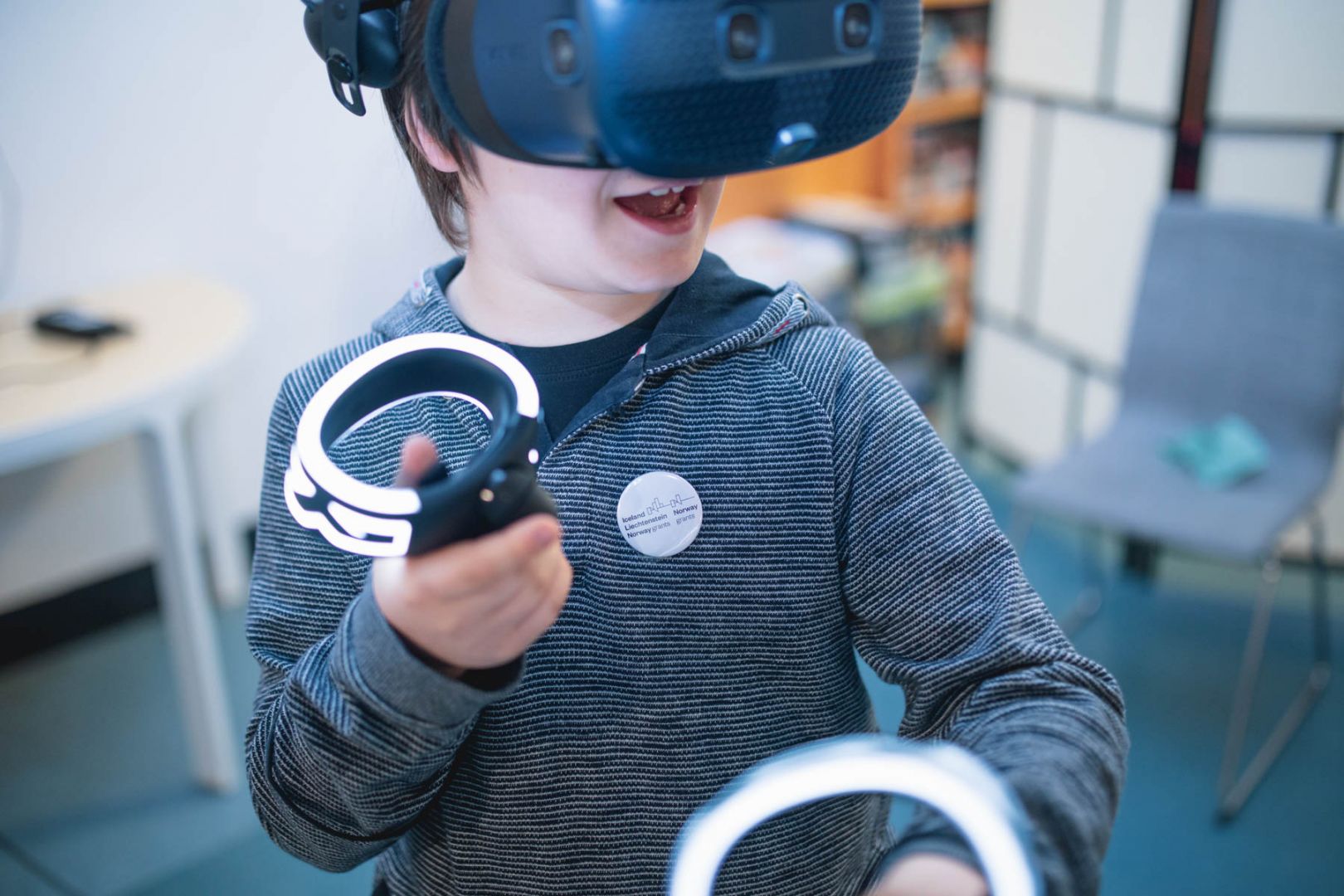
On 22 June at 12 noon in the Westfield Chodov shopping centre, our first official outreach event will take place under the banner of the EEA funds and our project.
The non-profit organization FOKUS has been helping people with mental health problems for more than 30 years. A community team leader and social workers will be on site, together with our lecturer Monika, to talk about virtual reality and its use in healthcare, and those interested will be able to try out relaxation apps in virtual reality to try and relieve everyday stress.
We are looking forward to seeing you!
With virtual reality, we will be part of Museum Night 2023, which the library will combine with music.
Where: Central library in Prague
When: 16 June 2023 | 17:00 - 21:00
The library will present its concept of using virtual reality, which focuses on serious and discipline-specific VR applications. The different disciplines will be represented by equally focused departments of the library, such as the music department, the literature department, the children's department and the Artotheque.
We are looking forward to seeing you!
The Municipal Library of Prague has its central building in Prague 1 in the Old Town, on Mariánské náměstí, No. 98/1. The neo-classical building built in 1924-1929 according to the project of František Roith still serves its original purpose as a public library. It has been a listed cultural monument since 1964. The three-storey entrance wing to the Marian Square has 19 window axes, with three-axis frontages on both sides.
3D tour of the library premises
The left side entrance in the arcade with a decorative tympanum leads to the Residence of the Mayor, decorated in Art Deco style. Its construction was one of the requirements of the original architectural competition. In addition to the official ceremonial areas (entrance hall, large reception hall and dining hall), it also includes other salons, a winter garden, the mayor's apartment and service areas.
3D tour of the Residence of the Mayor
Říše loutek is an amateur puppet theatre in Prague, founded by sculptor Vojtěch Sucharda in 1920. In 1928 the company moved to new premises, built as part of the new building of the Municipal Library of Prague. The theatre is entered through a side entrance from Žatecká Street.
Stay up-to-date with us
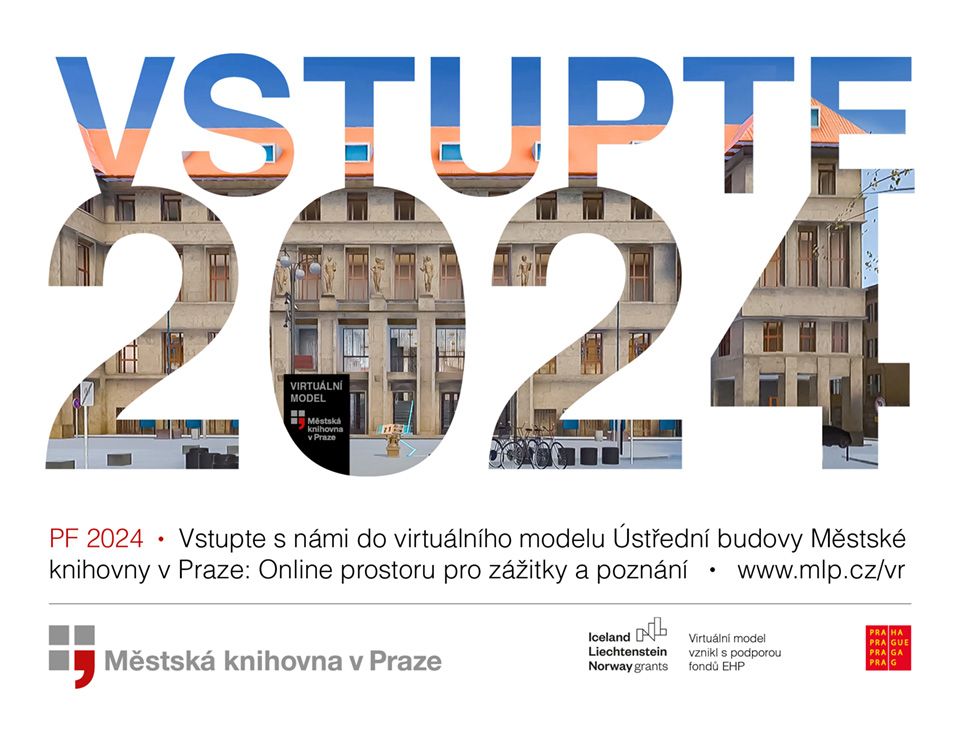
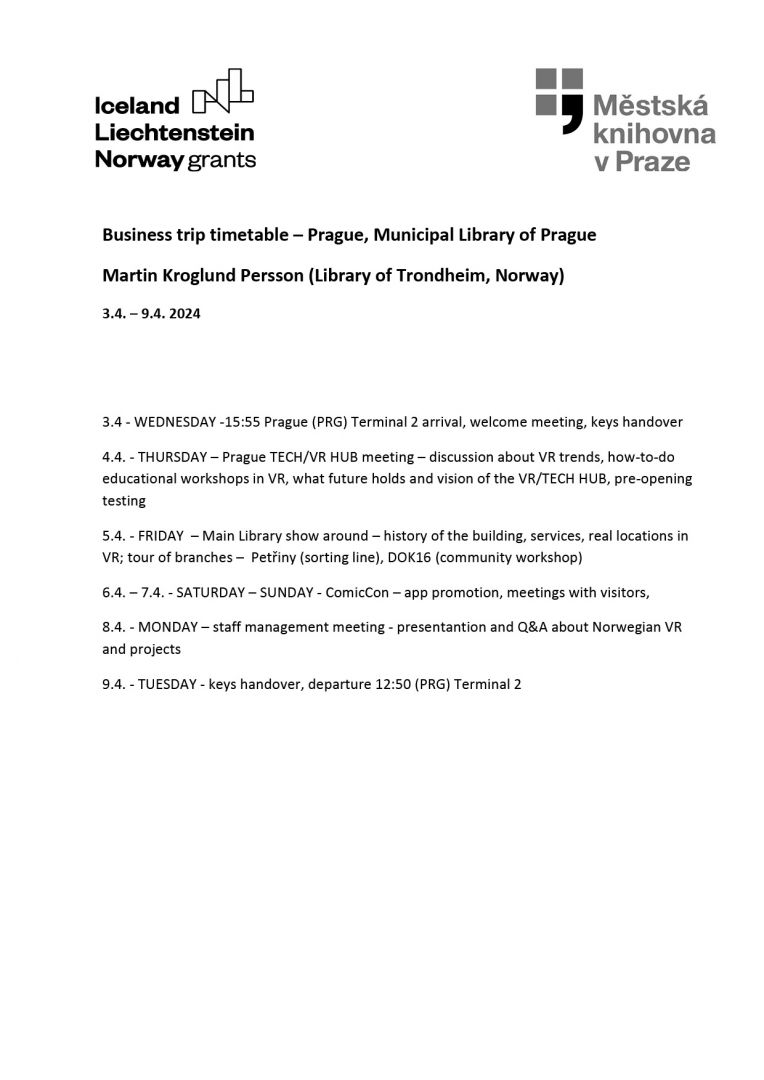
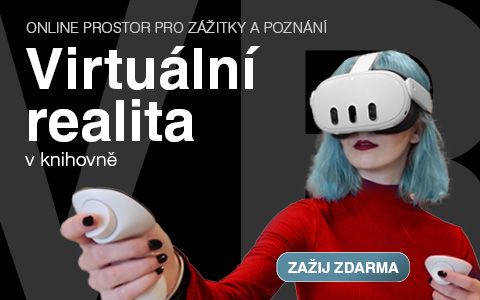
31. 1. 2024
Online campaign launched
The Municipal Library in Prague has donated part of its funds to launch an online campaign to draw attention to a new service in the library as well as to the Visiolibrum application, which was created within the project Virtual model of the Central Building of the Municipal Library in Prague: an online space for experience and knowledge.
The campaign appeared throughout January on various websites.
Those interested in further information were redirected to the Prague City Library website, where they could read more about virtual reality in the library.
You can read the full text here.
Victoria Lopuchina and Tim Voronkin responded enthusiastically to the City Library's offer to host lectures and workshops on innovative technologies, including VR and AI.
As part of the initiative "Immerse yourself in the future: learning about virtual reality technologies!" more than 100 Ukrainians created their first drawings in virtual space in the Tilt Brush app - a total of 16 hours of theory + practice in VR.
The desire for new knowledge does not depend on age, so both five-year-old and seventy-year-old learners were in the course. Although of course, most of them were school-aged children with their moms, who were given an incredible opportunity to make up for their educational losses in media literacy and mastery of modern technology. Social and emotional support, establishing mutual understanding and easing psychological tensions between children and relatives are the main goals of the joint education.
An important element of the success of this initiative was the close cooperation, synergy and understanding of the team of experts from the Czech Republic and Ukraine.
The management of the Municipal Library in Prague, Martina Šedová - coordinator of the MLP Virtual Reality project events, Yulia Rusetska - coordinator of MLP programmes for the Ukrainian community, and the VR creators from Ukraine - architect Victoria Lopukhina and her son Tim Voronkin - found common ground and put a lot of effort into the implementation of this event.
All this was made possible by the initiative of the Municipal Library to introduce innovative technologies into everyday life and to expand the possibilities of library users by introducing VR technologies into the library's work.
Implementation of the workshop "Immerse yourself in the future: getting acquainted with virtual reality technologies!" at the Municipal Library in Prague was not only an educational initiative, but also a source of innovation and creativity for the Ukrainian community.
Now, on the eve of Christmas and the New Year, we hope to continue this initiative in the coming year. The range of innovative technologies is expanding every day, and thanks to the initiative of the City Library, students and adults can stay open to new knowledge and constantly acquire new skills.
Let 2024 be a new step towards a better educational and technological future.
In Prague, 20.12.2023
Victoria Lopuchina and Tim Voronkin
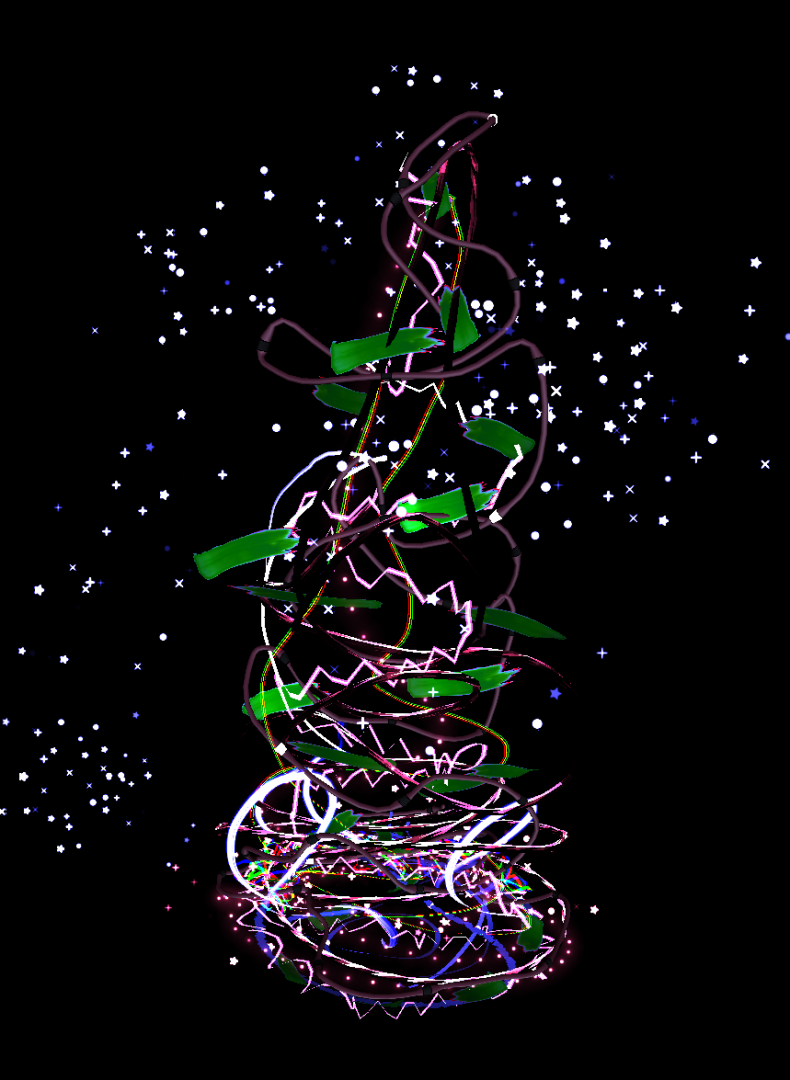
In a world of rapid technological change and unexpected circumstances, innovation is becoming a key stage in the development of culture and education. One of these initiatives is the organisation of workshops and lectures on virtual reality (VR) at the Municipal Library in Prague. And it's not just educational events, but a creative collaboration project with refugees from Ukraine - the family duo ZViT Studio: architect Victoria Lopuchina and developer Tim Voronkin.
Before becoming part of the Prague community, the mother and son team from Ukraine had an impressive track record of developing VR projects in their home country.
Victoria Lopuchina has a Master's degree in Architecture and is an experienced architect and designer who has also worked as a producer in the film industry. She saw the potential for professional growth and retraining in VR technology during the pandemic. Tim was 15 years old at the time.
Despite stereotypes about the different worldviews and mastery of the latest technologies between different generations, the bond between mother and son became the foundation of their creative duo.
STUDIO ZVIT
Thus was born the family studio ZViT - a duo of an architect and a developer who independently develop VR projects from concept to finished app. Their professional achievements include educational, artistic and social projects created with the help of VR technologies. However, this rapid professional growth was interrupted by the war in Ukraine.
Since March 2022 the whole family (Victoria has a little daughter Zoriana) lives in Prague. After recovering from such a quick turn of fate, they continued their professional activities. However, their VR projects have acquired a new goal - to spread information about the war in Ukraine.
In these less than two years, the mother and son duo created 2 major projects about the war - the VR museum "Ukraine. War. Genocide XXI" and VRchat BLOODBATH.
The experience of international interaction in 2022-2023 at festivals, conferences and seminars allowed to understand the importance of fighting propaganda and disinformation with VR technologies.
The Spirit of Raindance 2022 award from the London Documentary Film Festival and the presentation at the Zip-Scene 2023 conference at the DOX Centre for Contemporary Art in Prague reaffirmed the importance of their professional activities.
Studying Czech, Victoria's diploma nostrification and Tim's admission to a technical university are just the first steps towards their professional journey in the Czech Republic.
They do not lose hope of working in their field and despite difficulties and circumstances they persistently look for new opportunities.
In Prague, 19.12.2023
Victoria Lopuchina and Tim Voronkin
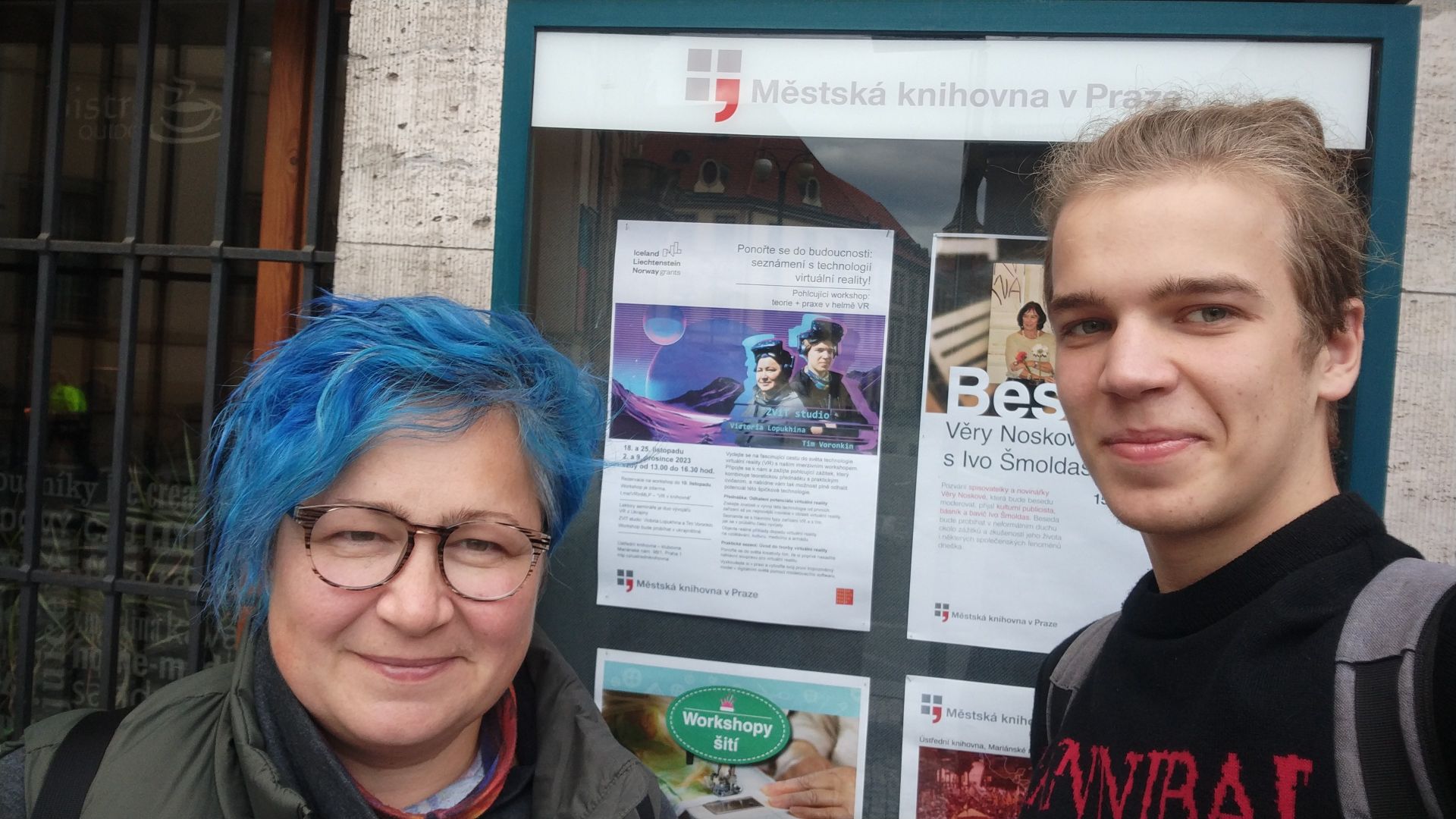
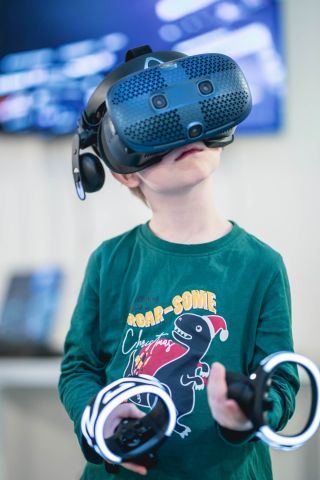
29. 11. 2023
Non-traditional library service: virtual reality
The website of the Municipal Library in Prague published an article about virtual reality as a non-traditional service provided by MKP to its readers. The article was thus sent out by Newsletter to the e-mail boxes of our readers.
You can read the full text here.
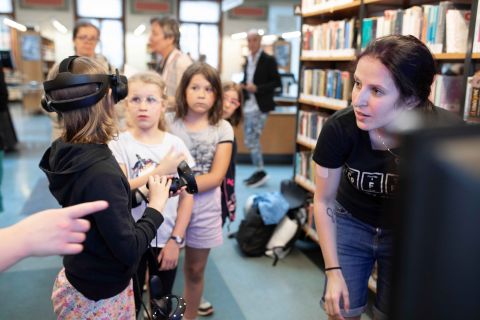
On 29.11.2023, an article about virtual reality as a non-traditional service provided by Municipal Library in Prague to its readers was published on the website of the MLP.
You can read the full text here.
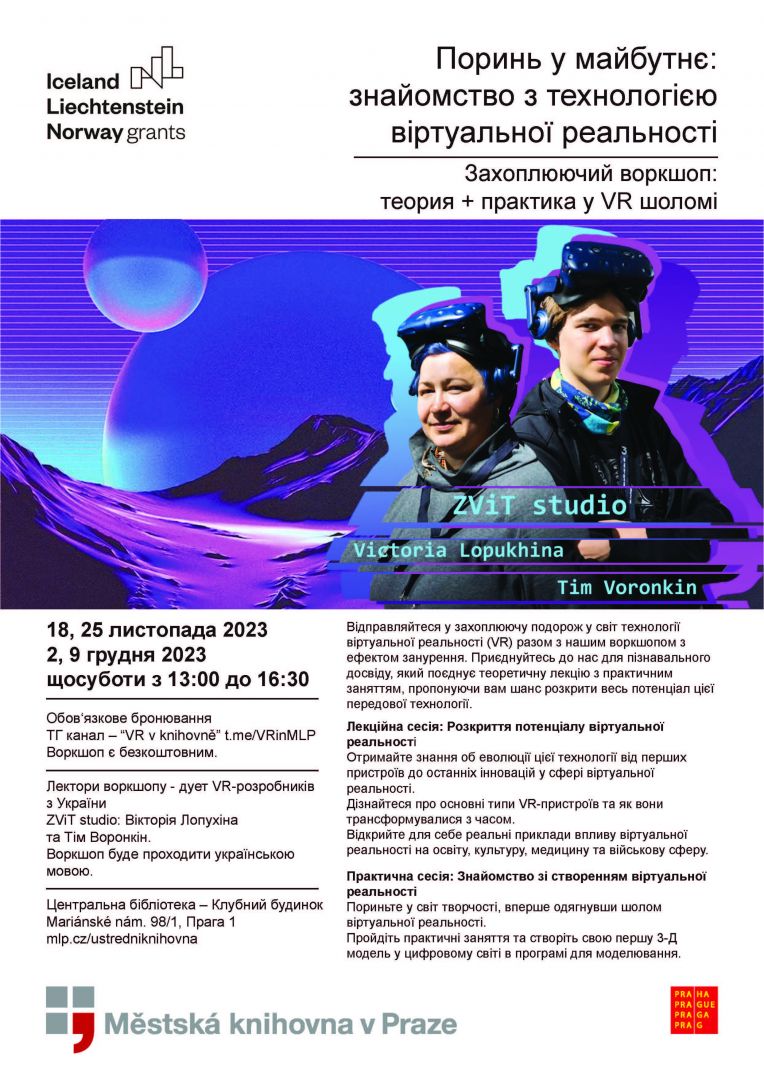
Not only during Mental Health Weeks does the City Library in Prague cooperate with the National Institute of Mental Health, but we are also an important partner of the Na hlavu festival.
Our good relations have led us to expand our cooperation and we have signed a memorandum concerning the cooperation on a programme for the elderly: Virtual City - a gaming system for cognitive training in a virtual world.
The National Institute of Mental Health, specifically the Center for Virtual Reality Research in Mental Health and Neuroscience, has long been dedicated to the application of virtual reality (VR) technology in comprehensive mental health care, education, and research in psychiatry and neuroscience.
We are delighted to join forces and participate in an exciting and worthwhile project.
On September 20, 2023 we participated in the Social Services and Non-Profit Organizations Fair 2023, the event was held in cooperation with the Municipality of the Capital City of Prague. Prague, the Ministry of Labour and Social Affairs of the Czech Republic, the Food Bank for Prague and the Central Bohemia Region, the Humanitarian Aid Foundation and the Centre for Social Services Prague 1.
Various non-profit organizations, state administration, foundations and endowment funds presented their work at the event and it was intended for both professional and lay public.
We represented the Municipal Library in Prague in the beautiful surroundings of Žofín and introduced the visitors to virtual reality technology and our project.
The pleasant afternoon was closed with a concert of The Tap Tap group, which consists of students and graduates of the Jedlička Institute, with which we cooperate.
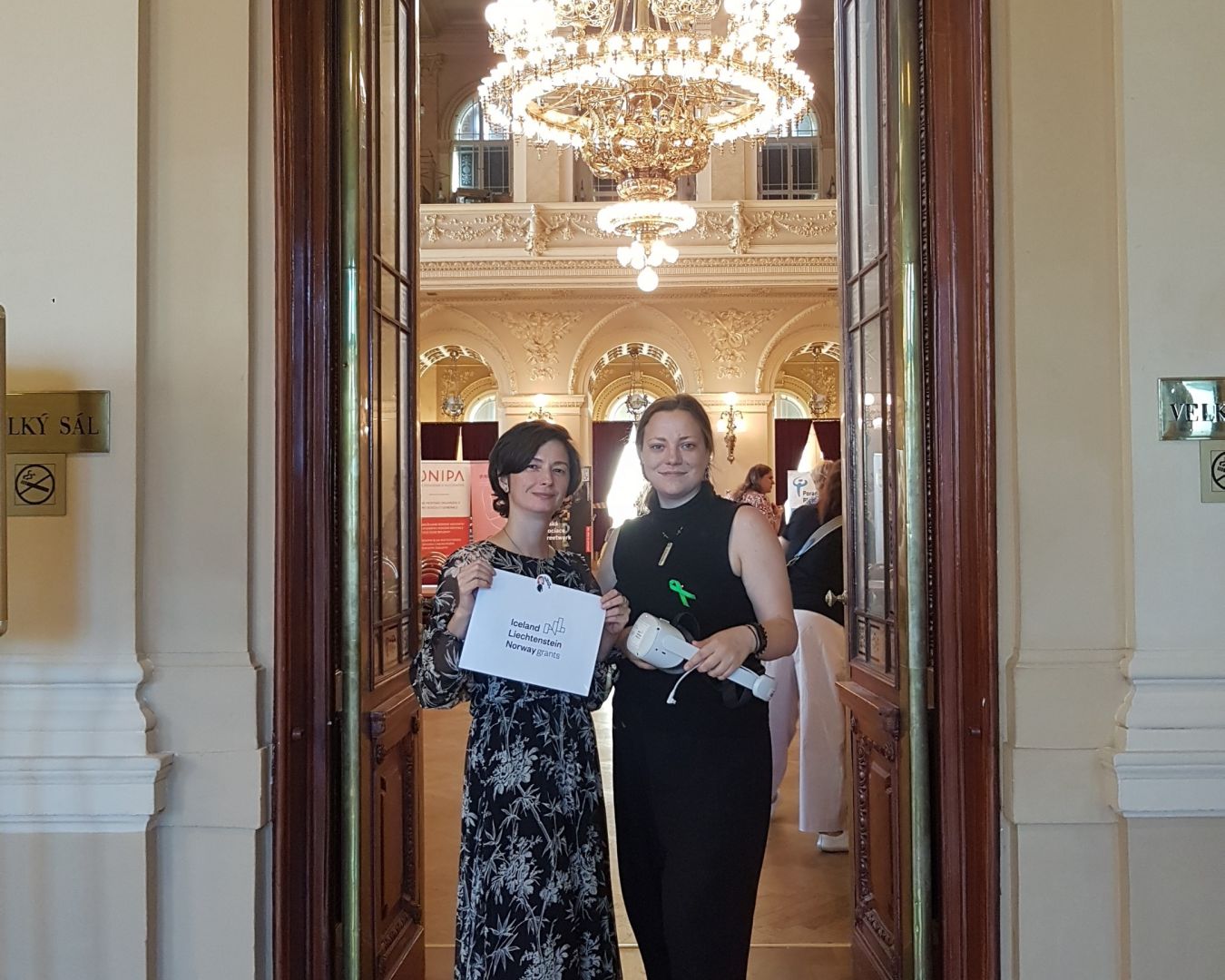
From 12 to 14 September 2023, a large library conference Libraries of Today was held in Olomouc. The Municipal Library in Prague regularly participates in this conference, so it could not miss this year either.
Last year we talked about how big and great a project we are planning and this year we have already presented a demonstration of our work, but also virtual reality technology in general. We demonstrated several types of virtual reality headsets. There was more interest in our program than we expected. All those interested tried VR and we also made valuable contacts that we will use for further cooperation in the future.
In conclusion, we would like to congratulate Mila Linc, one of the authors of the project that received the Z. V. Tobolka Medal for his significant contribution to the development of Czech librarianship. Congratulations!
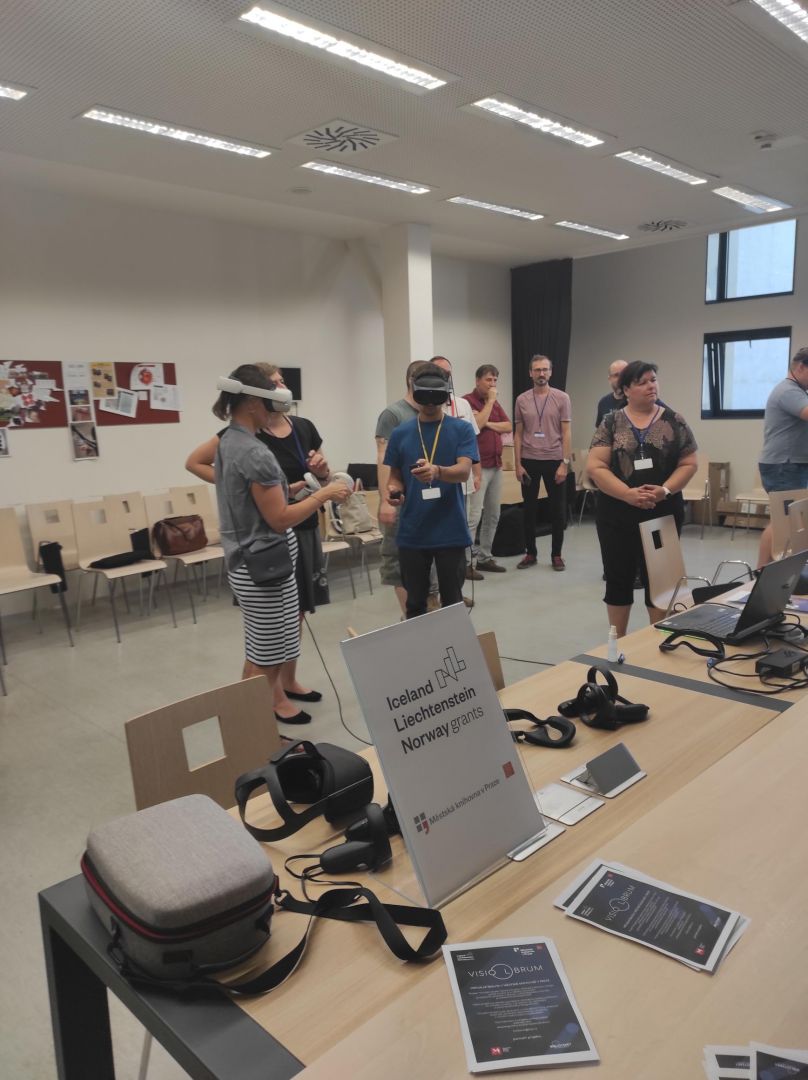
Seniors and technology? And why not. The joy was great, and not only thanks to virtual reality, which allowed active seniors to take a trip to the underwater world. Helpful lecturers assisted with putting on the headsets and explained how the controllers work and helped.
All the meetings with the seniors were very emotional. People living in homes for the elderly enjoy every visit and when such a visit also brings experiences, wishes fulfilled, the opportunity to see places they would never have looked at, it is all the more joyful.
We also encountered the limits of VR, where not all seniors were able to operate the controllers or move around the space. In these cases, it might be appropriate to choose a VR movie or other static application. However, every experience is valuable and the main thing is that the overall impression was very good.
Seeing the positive reactions, the staff at the retirement homes became keenly interested in what needed to be done to get the VR glasses.
We certainly won't be here for the last time and are already looking forward to our next visit.
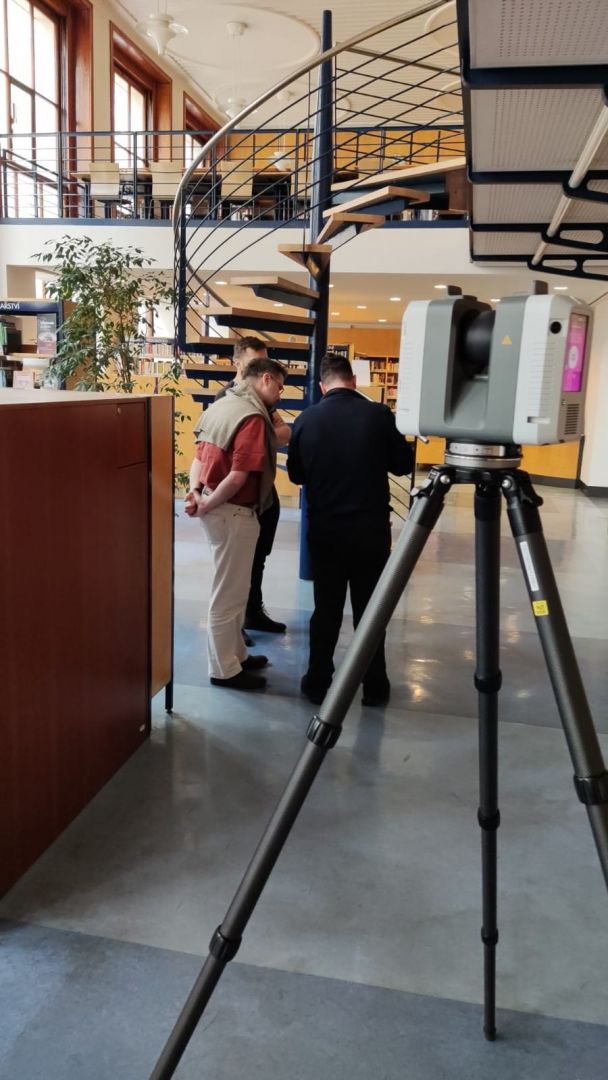
On 12 July, the alpha version of the VR application of the City Library, developed within the project "Virtual model of the Central Building of the City Library in Prague: an online space for experience and knowledge", was presented to the realization team in Library.
The representatives of the contractor, the project team and the representatives of the Methodology and Services Department of the FAC met in the library cabinet at Mariánské nám. 1. All participants had the opportunity to try out an early version of the virtual copy of a part of the central building of the Municipal Library, which, however, already contained all the game functionalities and the indicated environment.
This was followed by a discussion of other potential improvements and optimization options, feedback on existing content, with some of it still to be changed based on feedback, and the next phase of testing opened up, including setting up rules for bug reporting. The latest version of the app has been shared with the Norwegian project partner, Trondheim folkenbibliotek, whose representatives will also participate in the next testing.
In May, the Annual Meeting of MKP employees took place, attended by almost all employees of the Municipal Library in Prague. The aim was to meet in person, which was denied to us during the covid years, to get acquainted with MKP news and also a rich cultural program. The participants had the opportunity to get acquainted with virtual reality, at two stations. Approximately 20 librarians tried out virtual reality and everyone had enough time to immerse themselves in VR. There were also experienced trainers on hand to answer the librarians' tricky questions. The overall feedback from librarians was very positive.
From April 2022, the Prague City Library is working on the project KU-CH2_018 Virtual model of the Central Building of the Prague City Library: an online space for experiences and knowledge. The project is supported by a grant from Iceland, Liechtenstein and Norway through the EEA Funds.
I was put in charge of the project in May 2022, when I joined the Municipal Library in Prague.
The development process has two main parts: the pre-production part and the actual development part. The pre-production part involves research, defining the specific form of the app and creating a design document (i.e. basically a manual for making the app). This part is what I spent most of my time doing in the library from spring to fall 2022.
The library does not have the capacity to develop VR itself, so based on the design document and in the spirit of the project, an outside firm was contracted to program our app. Since it is not in human power to write the design of the app down to the smallest detail, it is necessary to maintain daily communication between the people involved in the development. Of course, despite all the conveniences of today's technology such as fast internet, video calls and file sharing, it is simply necessary to meet in person from time to time and go over everything face to face.
That was the purpose of my three-day trip to Žilina.
The tender for the production of our application was won by the Slovak company "exe a.s." (https://www.exe.sk/), a medium-sized IT company dealing with training, development, implementation and resale of SW and HW. The company is based partly in Žilina and partly in Bratislava.
The technological part of the company is located in Žilina, including programmers and graphic designers who work on our application. Due to the several-hour train journey from Prague to Žilina, I left on Sunday afternoon, arrived in Žilina after 10 pm and checked in. There were two working days with normal working hours. Everything was done without unnecessary formalities and lengthy presentations. The gentlemen from exe a.s. showed me the stage of processing of 3D scans taken a few months back. I got my hands on the programmer Filip Lazar, who codes the game mechanics, and with him I went through the whole design step by step to clarify the details. That's exactly the kind of activity you can't replace with a video call. Especially if you're developing a VR app. You can show and explain everything in person using your hands and in space. It all looks almost comical, basically, with one person playing an activity from the app to another with commentary. For example, "So I'm going to take a book in my right hand like this. I'm going to turn around and put it on the counter like this." There are a total of 5 mini-games in our app that needed to be played in this way.
On the second day we worked on the demos that Filip had already programmed and debugging them. To give you an idea, I can mention an interesting misunderstanding that was cleared up thanks to the face-to-face meeting: in one minigame, the player will scan books using RFID in the central hall. The librarian behind the desk is of course standing, but the programmer from Žilina, who has never been to the MKP Central Library, cannot know that. At the same time, I did not mention this detail in the design. The counter in the mini-game was designed by Filip to suit the person sitting down. And that was the first thing he subsequently changed in the app.
You will discover many similar details in two days. The output is a multi-page write-up and the whole thing speeds up development by weeks, sometimes months.
I spent the last day at the headquarters of exe a.s. in Bratislava, where it was already an official and courtesy visit. After all, it is good to get to know everyone, especially when you are dealing with a contract in the millions of crowns.
Perhaps the most important outcome of my trip is that I personally know the people who produce our app, I have connections to all of them - and we have been in contact every day since then, we can solve small things based on things we have said face to face.
April 2023, Marek Ďuriš
On Friday 31.3.2023, the Central Library hosted a night with Andersen. The program was directed by Radio Junior and was supplemented by activities prepared by the library. These included virtual reality, board games for young children and of course book lending.
From 16:00 to 22:00 visitors continuously arrived, during the afternoon mainly families with small children and later older children arrived.
The virtual reality corner was a success, with a small group of children constantly forming around the screen and headset to try out virtual reality. Just before 5 o'clock, Marek Ďuriš also had a short radio appearance, talking about virtual reality, reading books and playing games. You can listen to part of the interview from 16:48:00 at : https://program.rozhlas.cz/zaznamy#/radiojunior/21/2023-03-31
The Night with Andersen was a great success and we are looking forward to the challenges ahead.
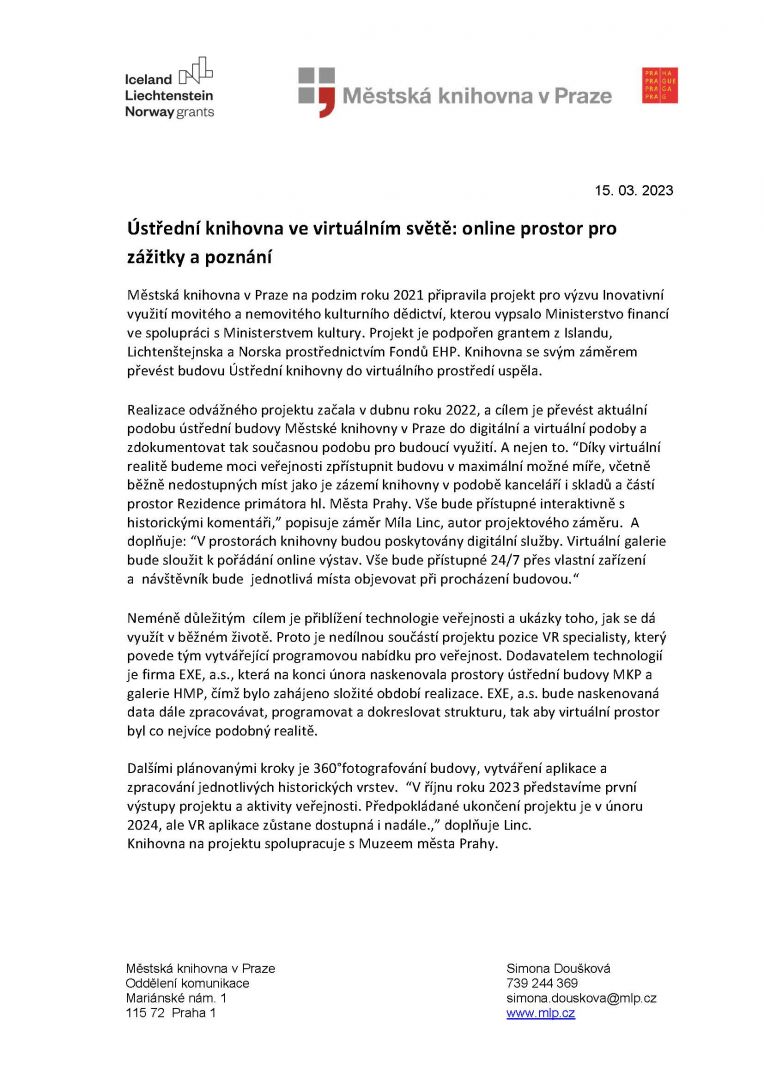
One of the first steps towards the implementation of our application was to scan the library space and the HMP gallery. EXE a.s. scanned the spaces and then created a structure from the scans, which they will further modify and add textures to make the digital space as close to reality as possible. The whole scanning was completed in one working day, there was a relaxed atmosphere during the event, and thanks to the professional approach and modern technology, there was no disruption to the library or gallery operations. The scanning took place on 27.2.2023.
A picture is often more than a thousand words and in this case it is true several times over. Check out the scanning process in our photo gallery.
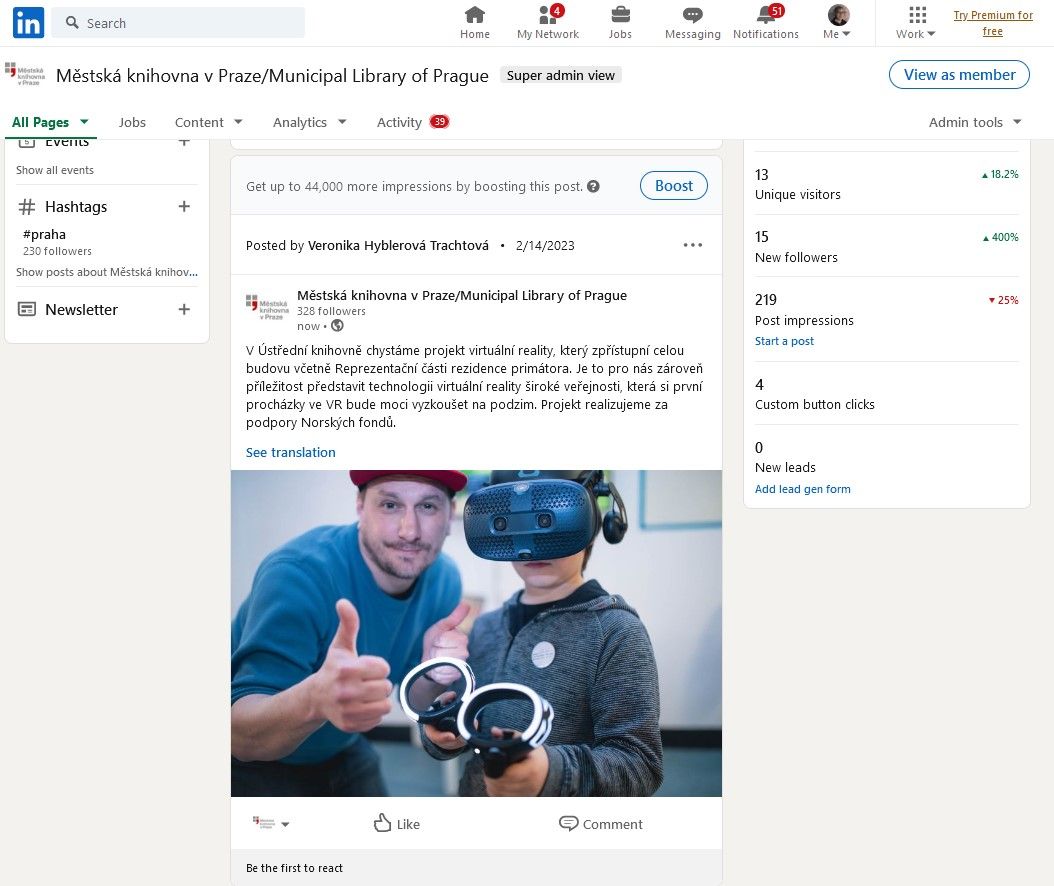
A major partner of the project is the Norwegian public library Trondheim folkebibliotek. Trondheim Folkebibliotek is one of Norway's largest libraries and the largest cultural institution in Trondheim in terms of the number of visitors (3500 per day). It is a community centre open to everyone regardless of age, gender, race or social class. It offers a wide range of books, magazines, newspapers, films, music and games. The library uses its own facilities to host a large number of activities.
The library employs around 60 staff at 9 branches in different parts of the city. The main library building is located right in the centre of the town and is connected to other historic buildings such as the former town hall, fire station and the town prison. Interestingly, the building stands on the remains of a medieval church and part of the archaeological excavations (skeletons) are exposed to the public. It is likely that this is the church dedicated to King Olaf II and which was built on the site where his body was hidden after the Battle of Stiklestad.
The project holds regular monthly online consultations to recap the current status of projects, share insights, challenges and advice, and next steps. Trondheim Folkebibliotek has practical experience with 3D scanning and converting historic library buildings into virtual reality. It is therefore a suitable partner for methodological guidance and consultation. He is currently leading two virtual reality projects. In terms of the Prague City Library project, it is interesting to follow the development, compare assumptions with reality and learn from the whole process, as our intentions are very much in line with what Trondheim Folkebibliotek is already building.
The first project is similar to ours. Trondeheim folkenbibliotek is scanning all its branches and is in the preparatory phase of creating 3D models. The aim is to showcase and make information accessible in an easy and efficient way, especially the historically interesting parts of the building and to preserve the image for the future. The next step is to gradually integrate the virtual space into the library's daily activities and service offerings. The virtual model will also be used to navigate around the library. Next, the plan is to 3D print the buildings and a series of workshops around this theme, gamifying the space into a virtual escape game or even a computer game. The main aim of these activities is to make the library more accessible and attractive to young people and to raise public awareness of the new services on offer.
In the second project, Trondheim folkenbibliotek is creating an interactive VR film (game) for which they will most likely use the 3D scans of the buildings from the previous steps. They are collaborating with a film studio Spaett on a film whose protagonist is the real-life Trondheim library librarian Johanna Matheson, who worked with the Resistance during the German occupation in WWII as a deliverer of secret messages between resistance groups, but was caught and executed. The film (play) will be the fictional story of a young girl who meets Johanna and needs her help. In a series of workshops and seminars for high school students, using VR sets, the audience will be transported to the same location they are in, but as it was during World War II. Students will explore many themes, explore (both virtually in historical form and physically in actual form) the library space, and face moral questions and difficult decisions.
The project implementers at the Trondheim Library, like us, are facing many challenges, but at the same time they are very excited about working on the project. We are each other's inspiration and every online meeting is a benefit.
Since January we know the winner of the tender. It is the company EXE a.s., which has been on the market for more than 30 years. EXE a.s. provides comprehensive services in the field of enterprise information systems design, software development and localization. EXE a.s. has several successful implementations in virtual reality. As an example we can mention a model of employee training in virtual reality for a customer from the energy sector. Our project is a great challenge and we are all looking forward to working together.
Currently, the main focus of VR use lies in the gaming and entertainment industry. After all, the current generation of VR has emerged from the gaming industry. Let's take a brief look at what other uses of VR outside the gaming environment.
For educational purposes, VR can be used in various fields such as medicine, architecture, engineering and others. Students can use VR to learn in a real-world environment to better understand complex concepts. Through VR, we can visit places that would otherwise be inaccessible due to distance or other limitations. For example, users can visit historical sites, exotic beaches, or travel through space. VR is used as a training environment in various fields such as medicine, sports, military and more. VR allows training in a safe and controlled environment with the possibility of repetition and feedback. VR also plays a role in psychology and psychiatry as a therapeutic tool for patients suffering from various disorders. Therapists can create an environment that helps patients overcome fears and phobias.
In marketing and advertising, VR enhances the customer experience and manufacturers can create interactive advertising campaigns that are engaging and original. Architects and designers use VR to visualize their projects in real time. Virtual reality allows users to see their designs in a spatial context and on a realistic scale. Virtual reality is used to create fun and interactive experiences for users. For example, virtual attractions in theme parks or interactive museums. In industry, VR can be applied as a tool to teach employees and improve safety. Users can train in simulated environments and better understand different processes and procedures.
VR is used to create new experiences in art and culture. For example, virtual exhibitions allow visitors to browse galleries and museums in the comfort of their homes. In science and research, VR is used to model various scientific processes and experiments. Users can interactively explore molecular structures, astronomical phenomena or even simulate nuclear weapons explosions. VR can also be found in the sports industry, where it is used to train and improve the performance of athletes, who can train in simulated environments and better prepare for real matches or competitions. Last but not least, VR is also appearing in the communication and collaboration sector between people. For example, users can collaborate on projects in real time and in a virtual environment.
The examples mentioned above show that virtual reality has a wide range of applications outside of gaming and is a fascinating and fast-growing technology.
The Municipal Library in Prague has announced a tender for a supplier who will implement a VR application. This application will have 4 parts, namely a replica of the library building modelled in 3D and optimised for VR, an educational HUB, a VR gallery and the Mayor's Residence. The deadline for submission of bids is 21.11.2022. More information and tender documentation can be found at tenderarena.cz.
We like to go to the library to get a good book, but what to do when fate doesn't favour us and we can't get to the library for various reasons. The Prague City Library has already solved this problem. It delivers books to people. So the question is, how can we improve the library service? In our project we expressed our wish to help people. Our VR specialist Marek Ďuriš joined forces with the Pink Bubble organization and DJ Friky and decided to pack VR glasses and go to the oncology department of the MOTOL Hospital to make the long days more pleasant for children.
The children welcomed this diversion and were grateful for the opportunity to get out of the hospital environment for a while to a place they had never been, to play a game and talk to someone who came from outside. We were struck by the fate of 17-year-old Carmen, who was able to see the sea through VR glasses and fulfil a wish that would otherwise have been impossible to realise. Not all stories have a sad ending, most children return home to their families and live a normal life, and the VR experience remains a fond memory.
We want to further develop this cooperation between the library and FN Motol, especially through the VR project and possibly by involving other library services such as Bibliobus or board games.
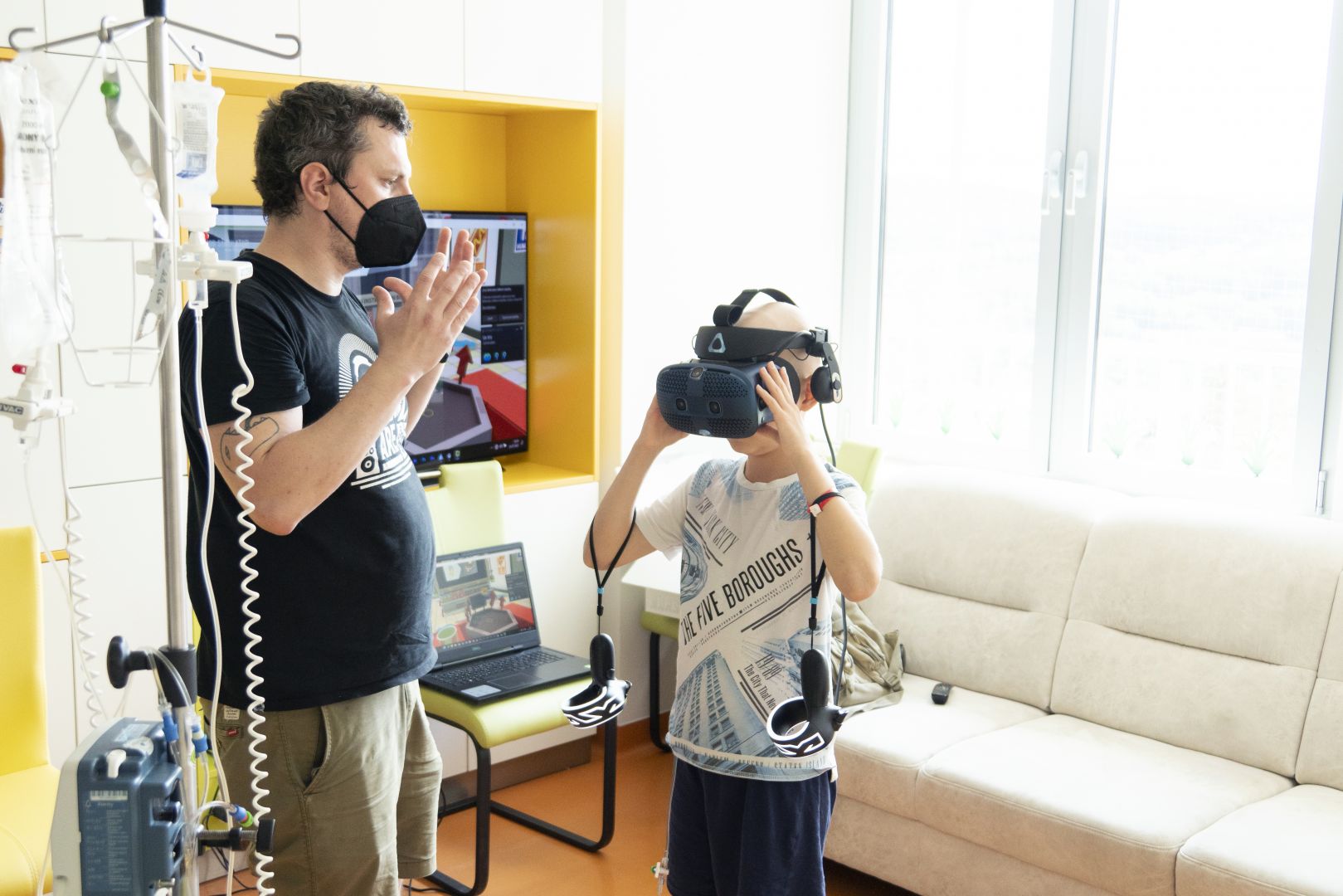
For now, the Prague City Library is focusing on the educational side of VR. The public can try a VR experience and visit the underwater world or meet Darth Vader in person through purchased apps. VR sets are available at the Opatov and Jezerka branches.
The Central Library has also started working with VR, where the VR project manager Marek Ďuriš is based. This means a shift from ready-made solutions to in-house development thanks to the implementation of a project financed by the Norwegian funds. The aim of the project is to create a 3D model of the Central Library on Mariánské náměstí, including spaces that are not accessible to the public, such as the Residence of the Mayor of Prague, or to create a virtual gallery with online exhibitions. But more about that next time...
The first attempt to build VR dates back to the late 1940s, when the United States Army began experimenting with the concept. From today's perspective, however, it was a comically complicated and enormous device. By the 1990s, there were several attempts to make VR usable in everyday life and, most importantly, to make VR with commercial potential. The most famous attempt was the VFX-1 goggles of the mid-1990s.
It can be said that the VFX-1 was a worldwide success, but due to its price, hardware requirements and certain impracticality (the goggles themselves weighed several kilograms), there was no chance of it becoming a mass affair.
The latest and current generation of VR has almost perfectly dealt with all the ills of previous generations. The purchase price is similar to that of a game console or an office laptop, its use is simple, it has an ergonomically sophisticated design and a wide range of supported uses. Several manufacturers are also embracing virtual reality for the first time, and the number is growing. The fact that several tech giants have invested in this generation of VR is a testament to its potential. Brands like Meta (formerly Facebook), Microsoft, HTC and Sony have created separate divisions dedicated exclusively to VR.
The immersion that VR can create is unparalleled compared to other audiovisual media. The ability to visit other historical periods or other places, and literally be there, has never been possible before. At the same time, VR doesn't require the user to have any form of dexterity with the controls as with video games. The user is completely free to look around and interact with the environment using hand-simulating controllers.
Like any emerging platform, virtual reality is also looking for opportunities for its use. In addition to the natural focus on the video game industry, developers are trying to find applications in healthcare, architecture, industry, education, art, etc. The openness of how and what virtual reality can be used for is both its strength and weakness. There is no beaten path, no guaranteed recipe for success, but at the same time it allows almost anyone involved in VR today to define the trends that will be valid in the future.
Virtual reality (VR) is a term that has been bandied about more and more in recent years. It refers to almost any activity that has moved online. Social networking is seen as virtual life, dating through apps is virtual dating and, last but not least, playing online video games often borders (especially from the perspective of older generations) on living a second, virtual life.
However, virtual reality is a technical term whose definition has little to do with how the general public perceives it. It was first used in the 1980s, when the definition itself was created.
Virtual reality is a device that completely simulates a real environment, using goggles or other devices to make the user see only the simulation. In it, he or she can look around in all directions while moving around, interacting with the environment using controllers. All of this takes place in real time. So we only talk about VR if all these conditions are met. This is also important to stress because nowadays, some aspects of VR appear almost everywhere, but as a whole they do not meet this definition.
It is also interesting to note that at the time the term was defined, virtual reality had already existed for several decades, not to mention its representation in literature and film.
During the prestigious conference Libraries of Today, which takes place every year in September and is attended by hundreds of librarians from all over the country and abroad, we presented for the first time our project: the Virtual Model of the Central Building of the Municipal Library in Prague: an online space for experience and knowledge KU-CH2-018, which is funded by the EEA and Norway Grants. The paper was included in the session dedicated to libraries as spaces. It was mainly about the transformation of existing libraries and their immediate surroundings.
This relates to one of the many lines we want to pursue - that is, before the actual renovation of our library, once it happens, to use virtual reality to plan the new look of the library together with our readers. We want to co-create the library space with the users who will then use it, and use this platform for participatory planning of a shared future.
At the same time, virtual reality will allow us to preserve not only the current form of the library, but also those that have been swept away by time. Thanks to the 3D model, there will be no loss of memory, and we will also gain great archival material that will allow researchers in the future to see the library as we see it today. And the historical line will in turn help education and other activities.
Of course, we're not the only library working with virtual reality. During conference breaks, we've been working with colleagues from other places to see what "more could be done," to forge collaborations and get a taste of their work. Overall, we were impressed with the project and if successful, we can expect it to interest other libraries as well.
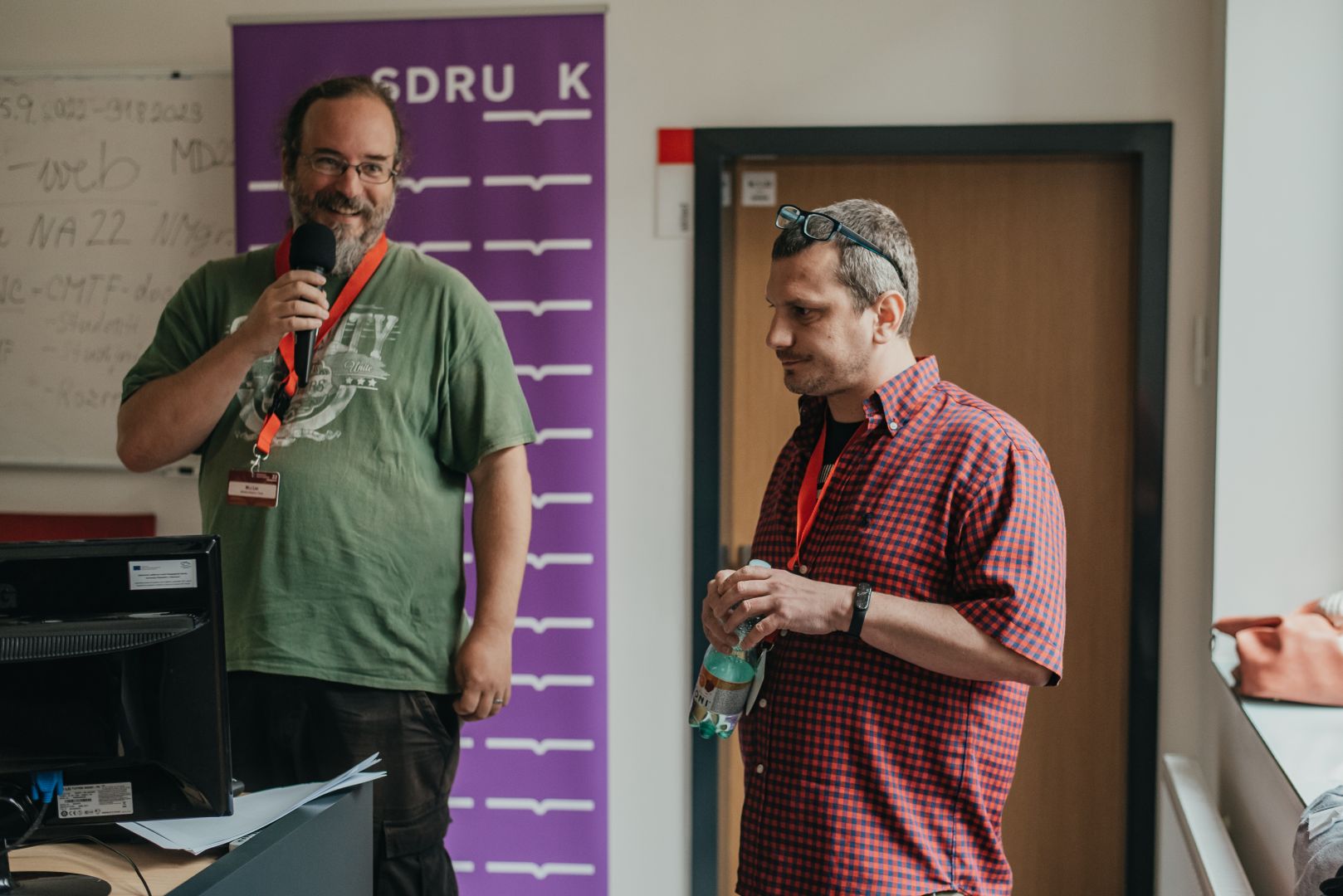
As part of the holiday Inspiromat, a videoconference on the ZOOM platform was held on 26.8.2022, which was intended mainly for the audience of library staff. The main protagonists were Míla Linc, Marek Ďuřiš and Michal Fojtík, who tried to bring the topic of virtual reality in the library closer to the audience. The listeners were introduced to the project and its goals, but they were also informed about how the project will be implemented. The videoconference was attended by 70 viewers and the project was very well received by them.
The challenge was opened by the Ministry of Finance as the programme facilitator in cooperation with the Ministry of Culture - programme partner Norwegian Directorate for Cultural Heritage and the Icelandic Centre for Research under the Culture Programme with a focus on innovative use of movable and immovable cultural heritage.
The main objective of this call is to strengthen the management of cultural heritage in the context of its use and thus contribute to regional development. Support was focused on regionally and locally significant immovable and movable cultural heritage with a strong potential to influence the social and economic development of communities. The funded project activities are not the main objective per se, but rather a way to ensure and encourage the long-term meaningful use of cultural heritage.
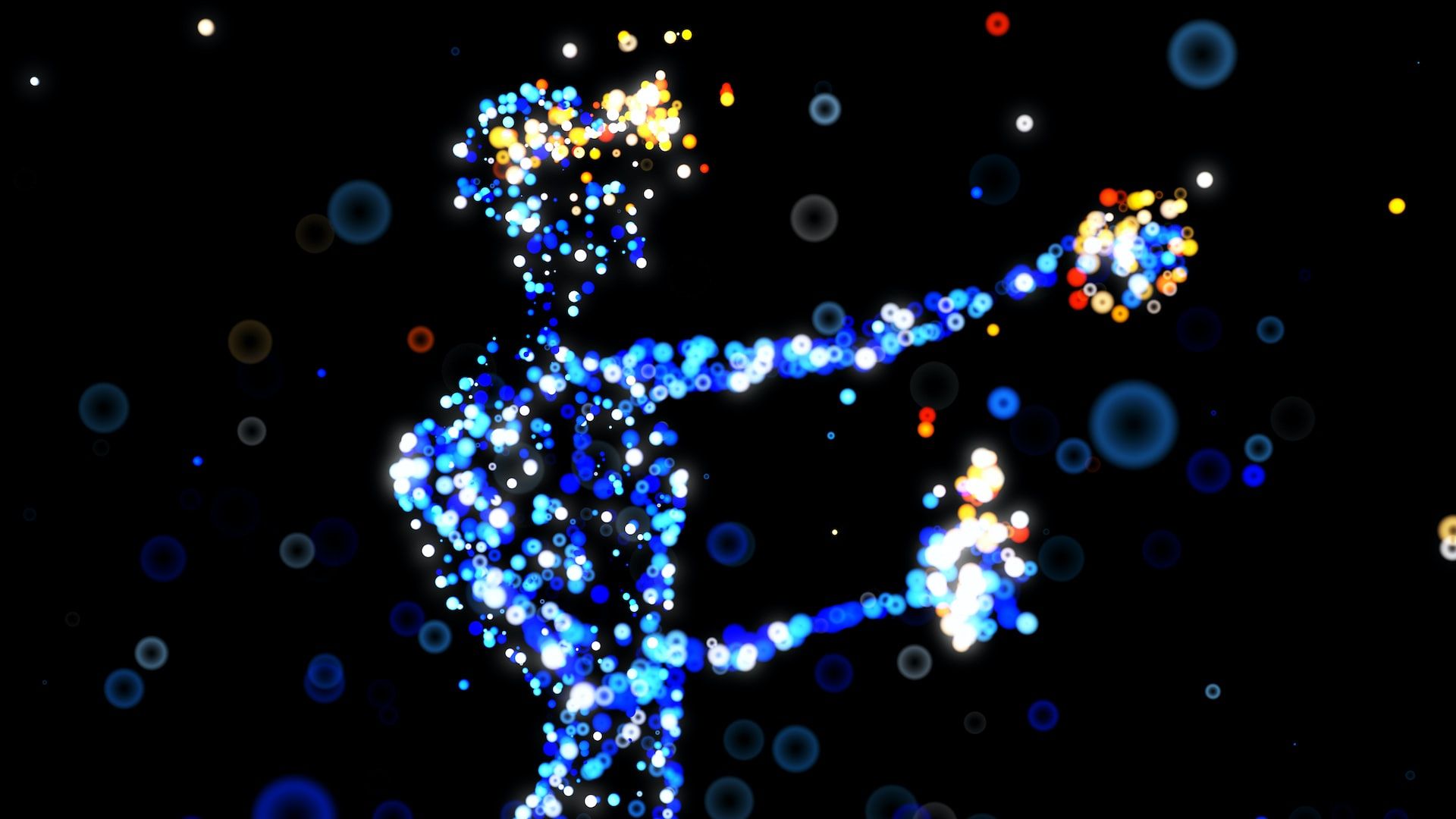
The Municipal Library in Prague with its project "Virtual model of the Central Building of the Municipal Library in Prague: an online space for experiences and knowledge" succeeded in the call and started to implement the project under the number KU-CH2-018 in May 2022.
We have set two main goals for the project:
We will convert the actual building into a virtual form using 3D scanning and modelling. We will also connect places that are inaccessible to the public as intended during the construction: the main spaces, the halls, the Puppet theatre, Prague city gallery and the Mayor's Residence. With partners, we will gather a rich commentary, interactively displaying it bilingually in individual logical layers and historical context. We will integrate digital services into the library spaces. A virtual gallery will be used to efficiently host online exhibitions. Everything will be accessible 24/7 via its own device, and the virtual visitor will discover individual places or consume activities directly as they walk through the building.
Around the virtual model, we will build services and a follow-up program that will be co-created with the public in a participatory approach, offering part of the space for free use. The outputs and "best practice" will be published as a free work. We will deliver a series of activities not only to traditional target groups, but with the help of new and already owned infrastructure and informal partners, we will physically take the programme to places where the library could not reach on its own with its usual services - to disadvantaged children or people with disabilities.
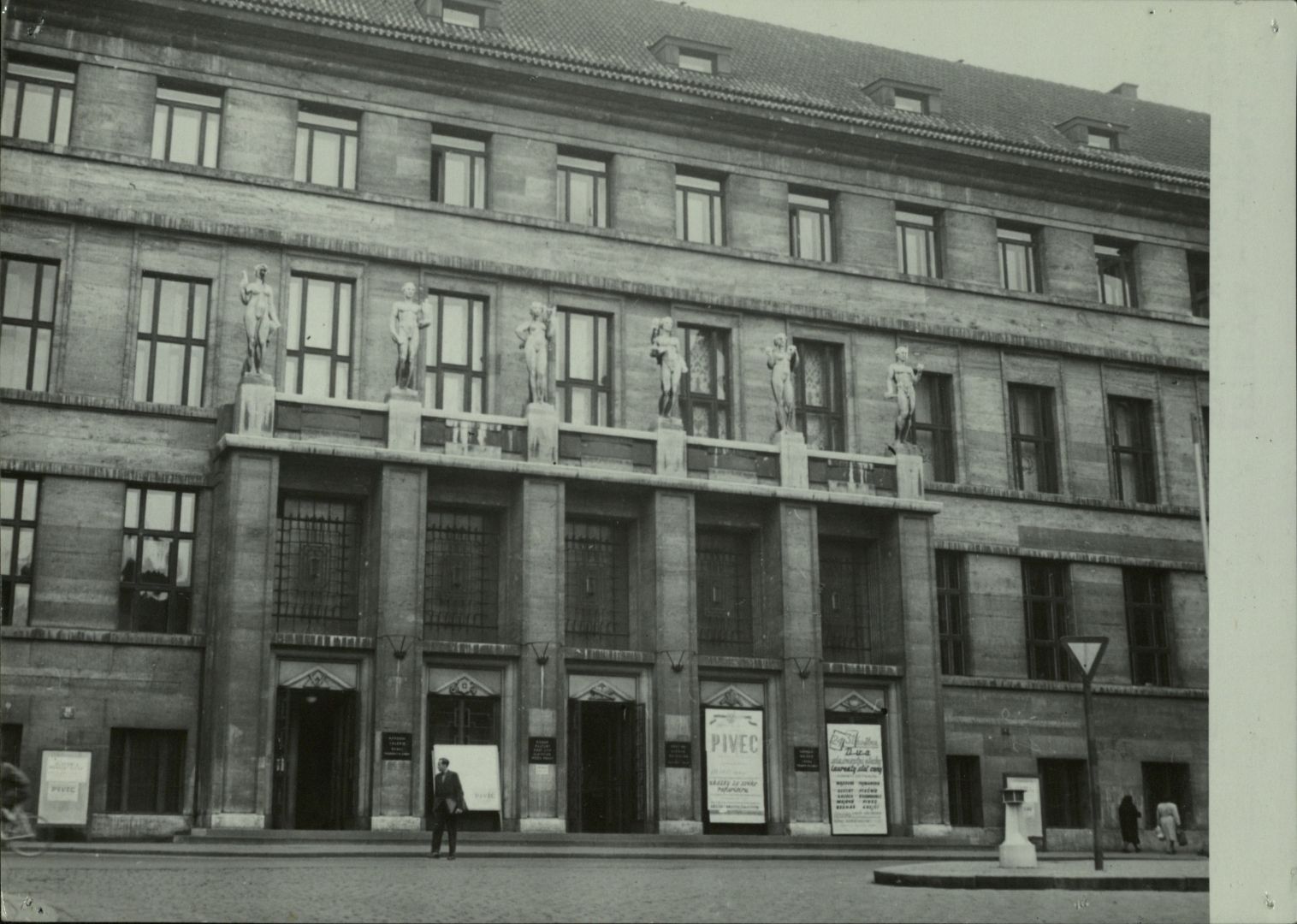
The central building of the Municipal Library in Prague, a neo-classical building constructed in 1924-1928 according to the design of architect František Roith, was the first purpose-built library building in Czechoslovakia and one of the most modern library buildings in the whole of Europe at that time. It was designed to accommodate a wide range of not only library, but also concert, educational and exhibition activities, which was certainly not common in its time. The generosity of the project is evidenced by the fact that the building was fully sufficient for the needs of the rapidly growing network until the mid-1970s. In 1997-1998 it underwent a sensitive renovation and continues to serve its purpose today, welcoming several hundred visitors a day.
A renovation project is currently underway to bring the building up to 21st century standards. This is due not only to the development of technology and changes in library work (possibilities of robotization, automation, etc.), but also to the overall transformation of library services, where the library is no longer the first choice for the mere provision of information. The library wants to offer and offers more comprehensive services, transforming itself into a flexible cultural and community and collaborative centre. It must offer a space for all those who want to learn, be entertained, discover or just spend their leisure time. An excellent library, as we understand it, facilitates this experience, an opportunity for learning, discovery and enrichment.
The virtual library is one of several ways in which we are working with our users to prepare tor this change.
Partneři projektu
